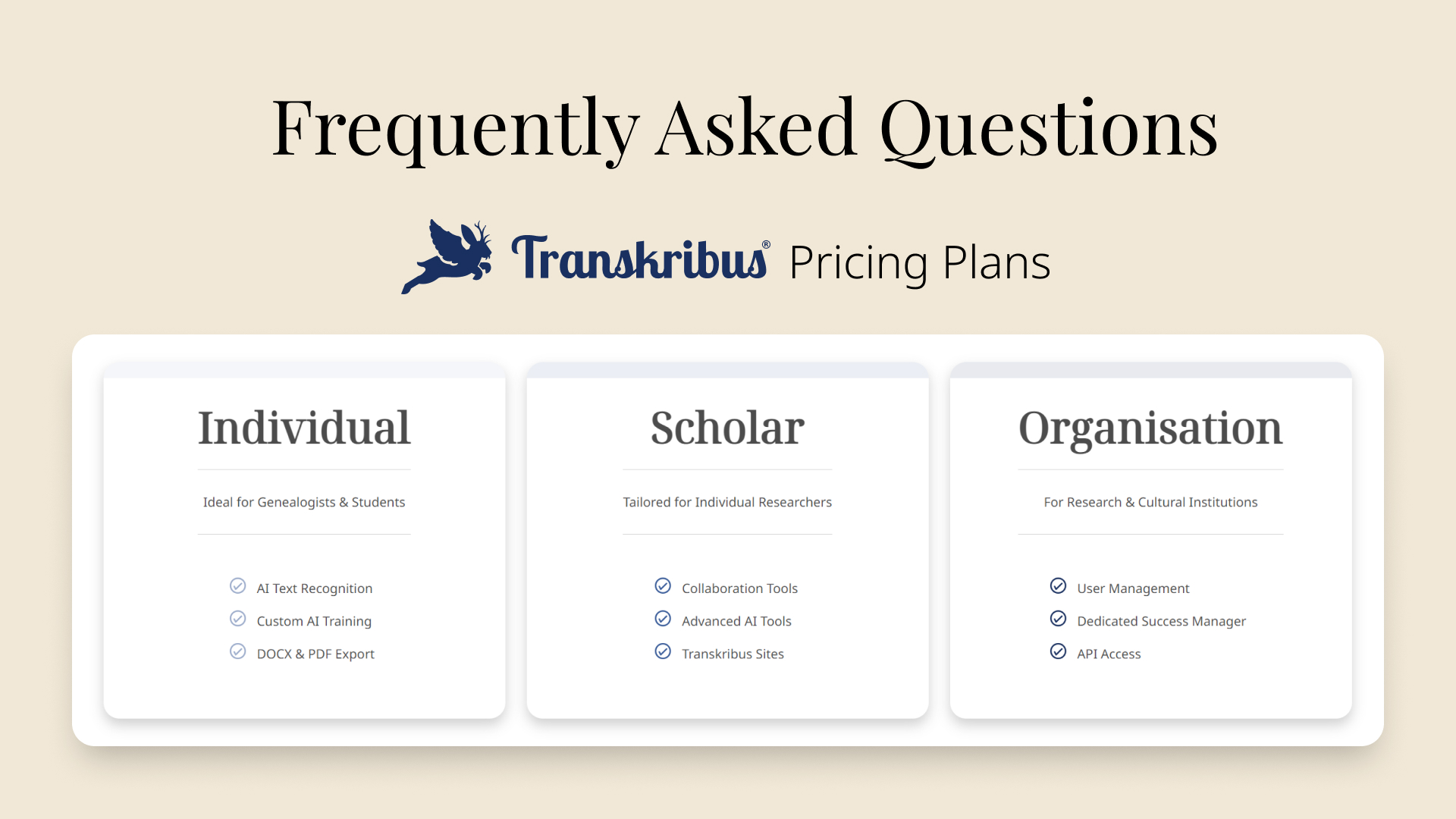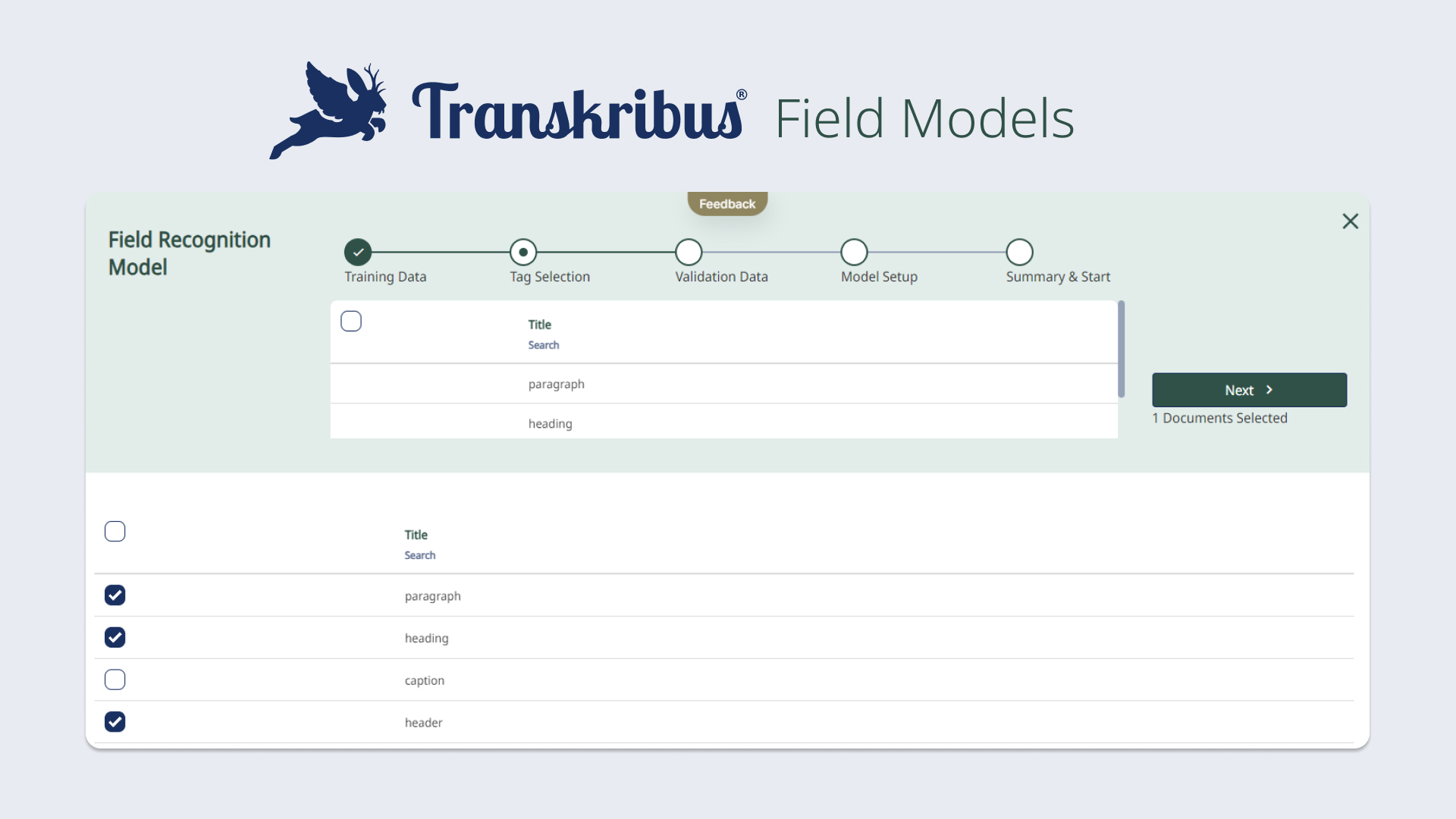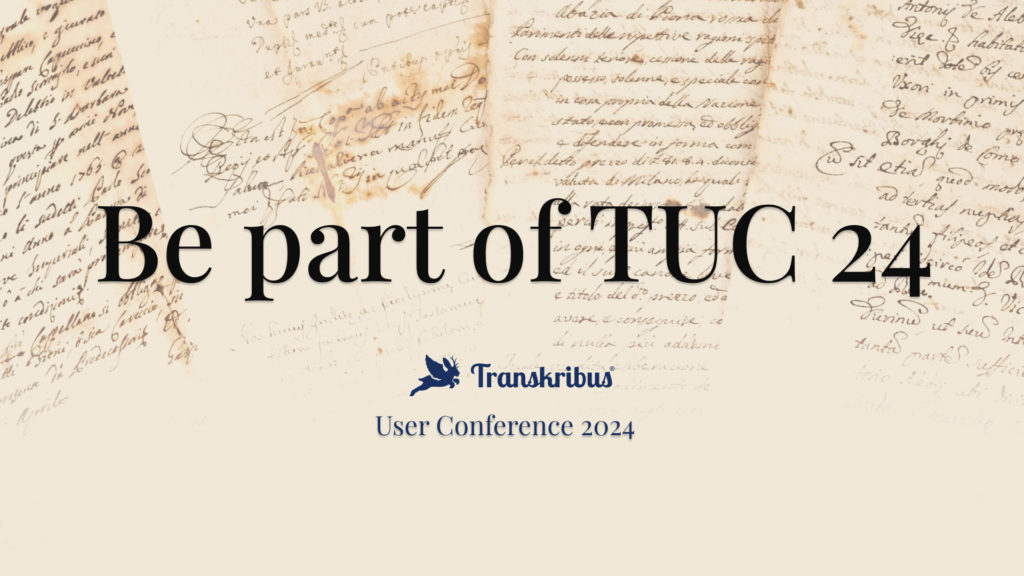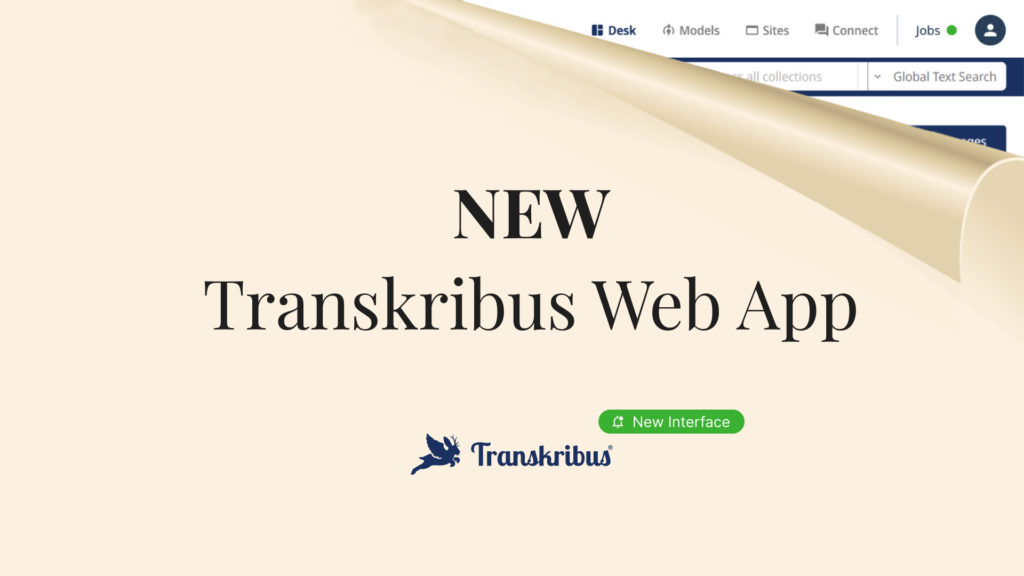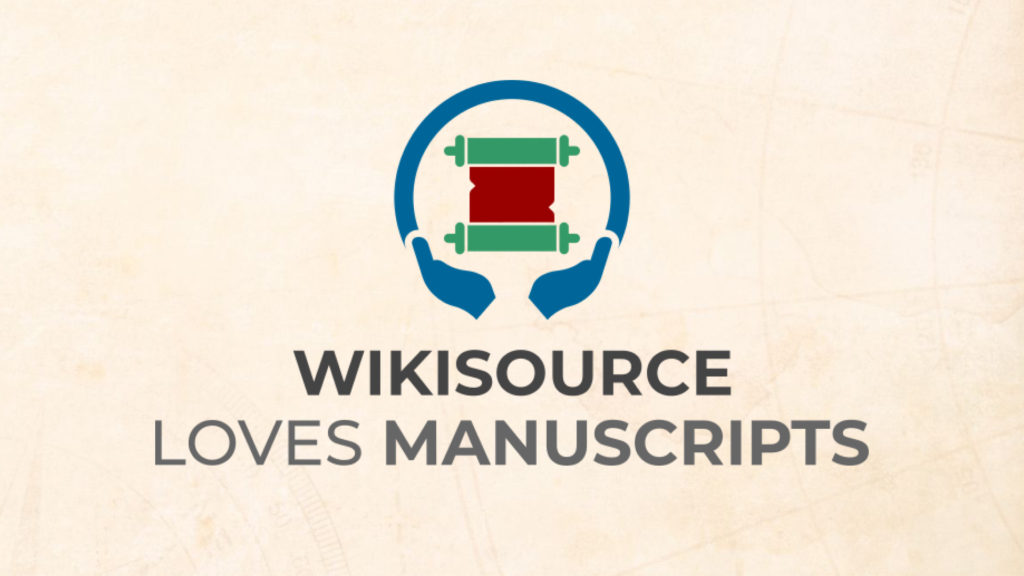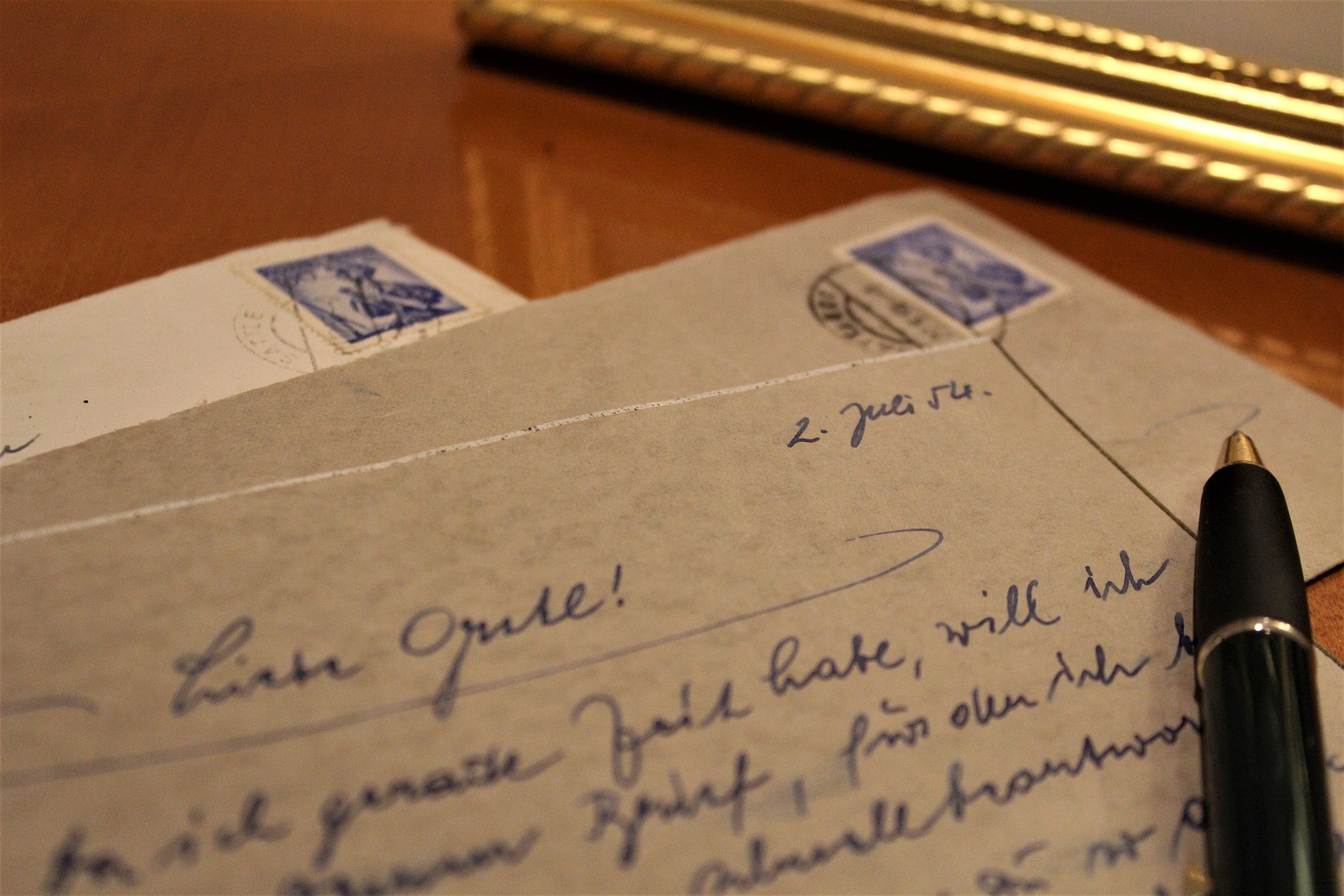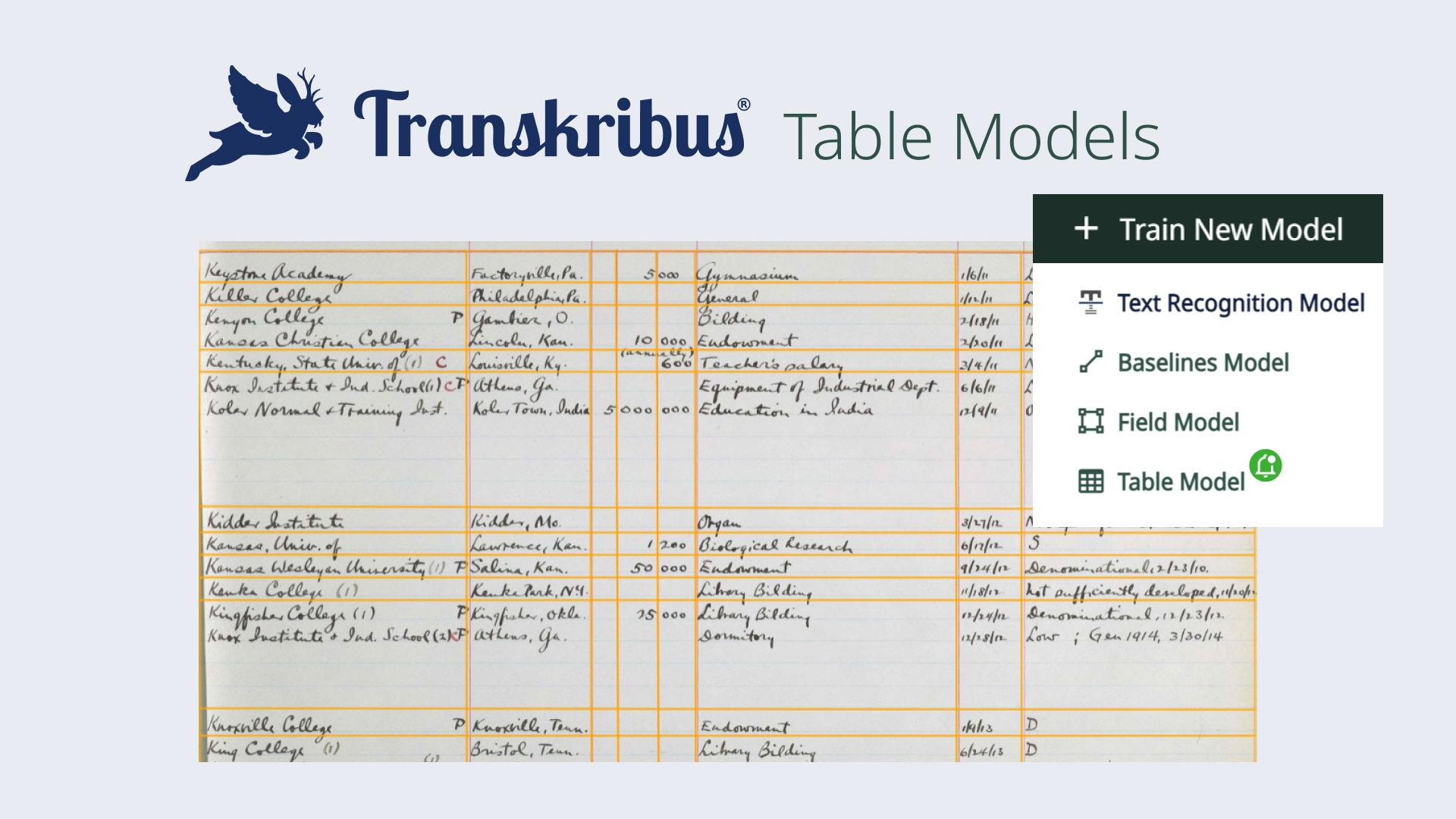Transkribus Blog
Insights, Updates, and Best Practices
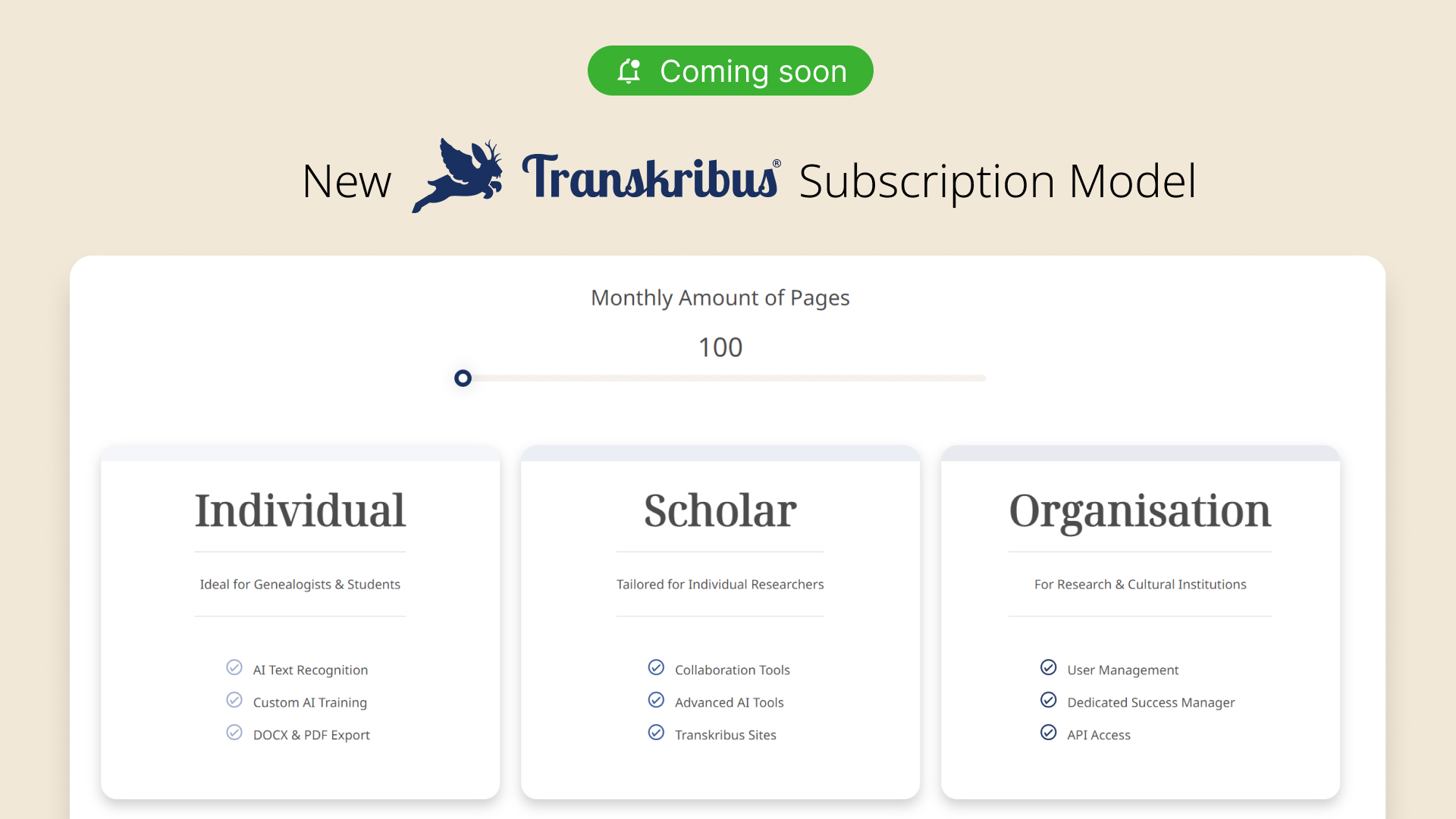
Coming Soon: Exciting Changes to Transkribus Subscription Plans!
As part of our ongoing dedication to improving and adapting to the ever-changing needs of our users, we’re excited to provide a sneak peek i
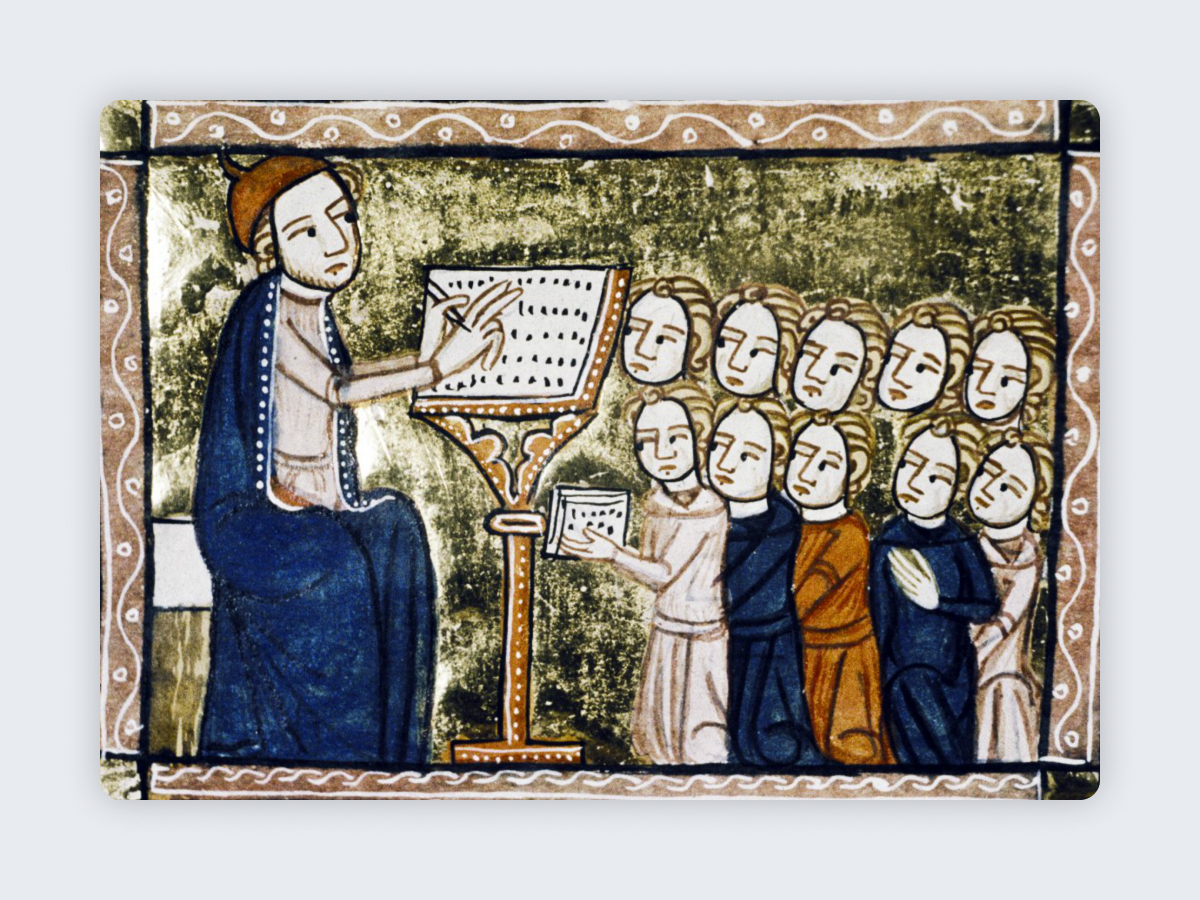
Transkribus has come a long way since its founding days at the University of Innsbruck and remains closely connected
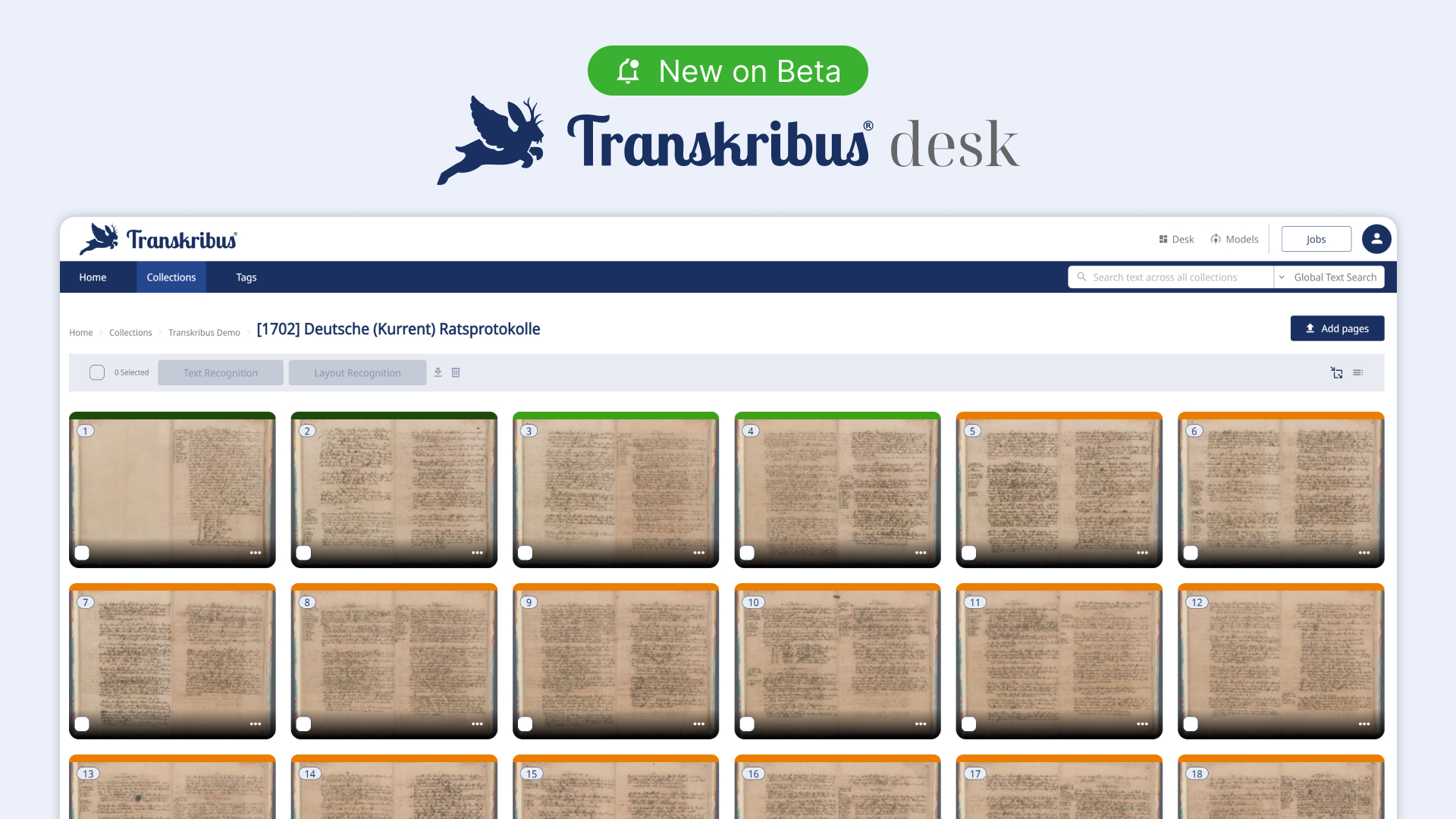
Try out the Transkribus Next Gen Desk on our Beta
Transkribus Desk is where the work happens.
We are thrilled to offer you a sneak peek into the future of Transkribus with the avai
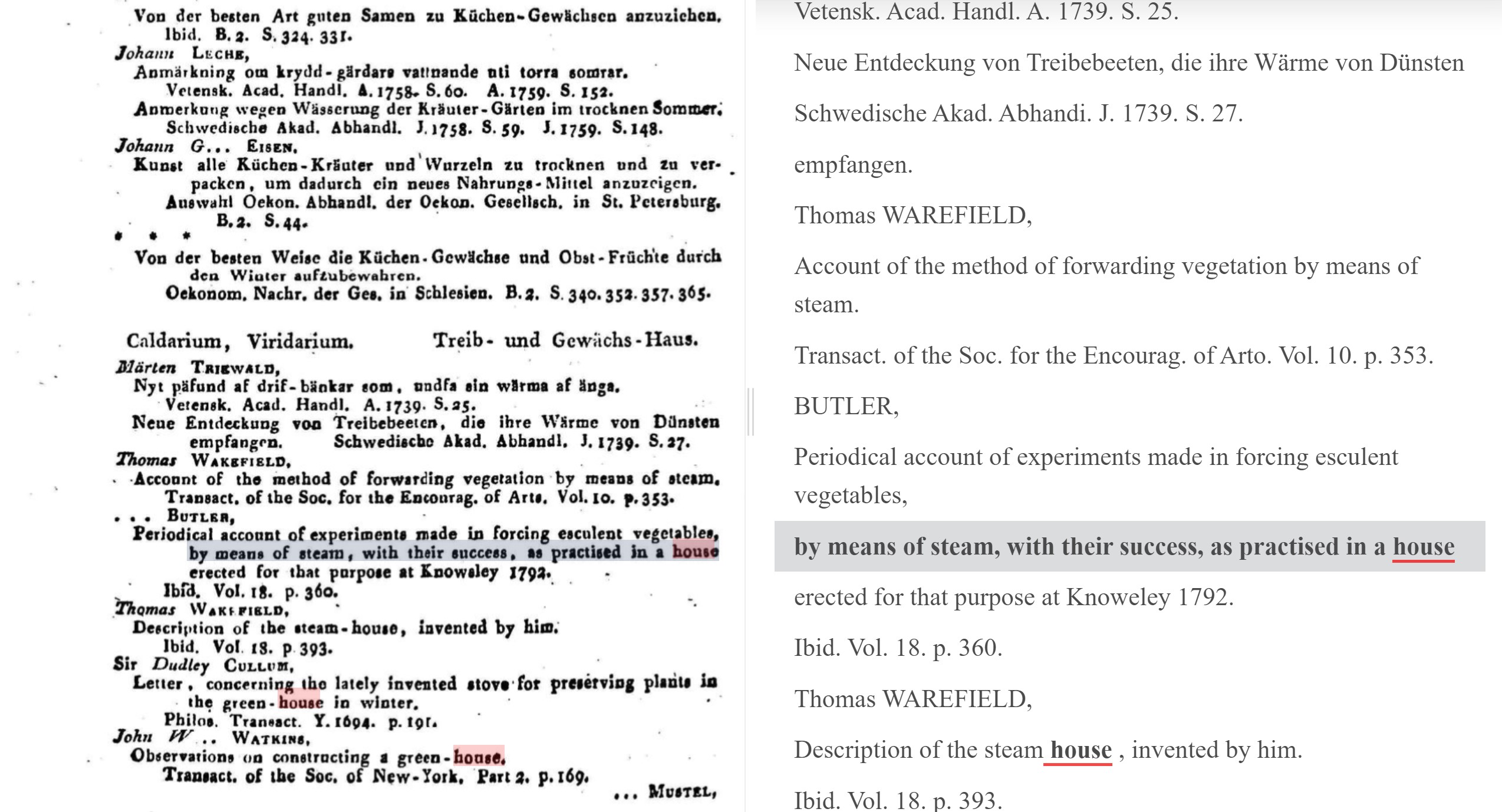
Using Transkribus for OCR with printed books
Transkribus might be known for its ability to transcribe and enrich handwritten documents, but did you know you can also use Transkribus as OCR so
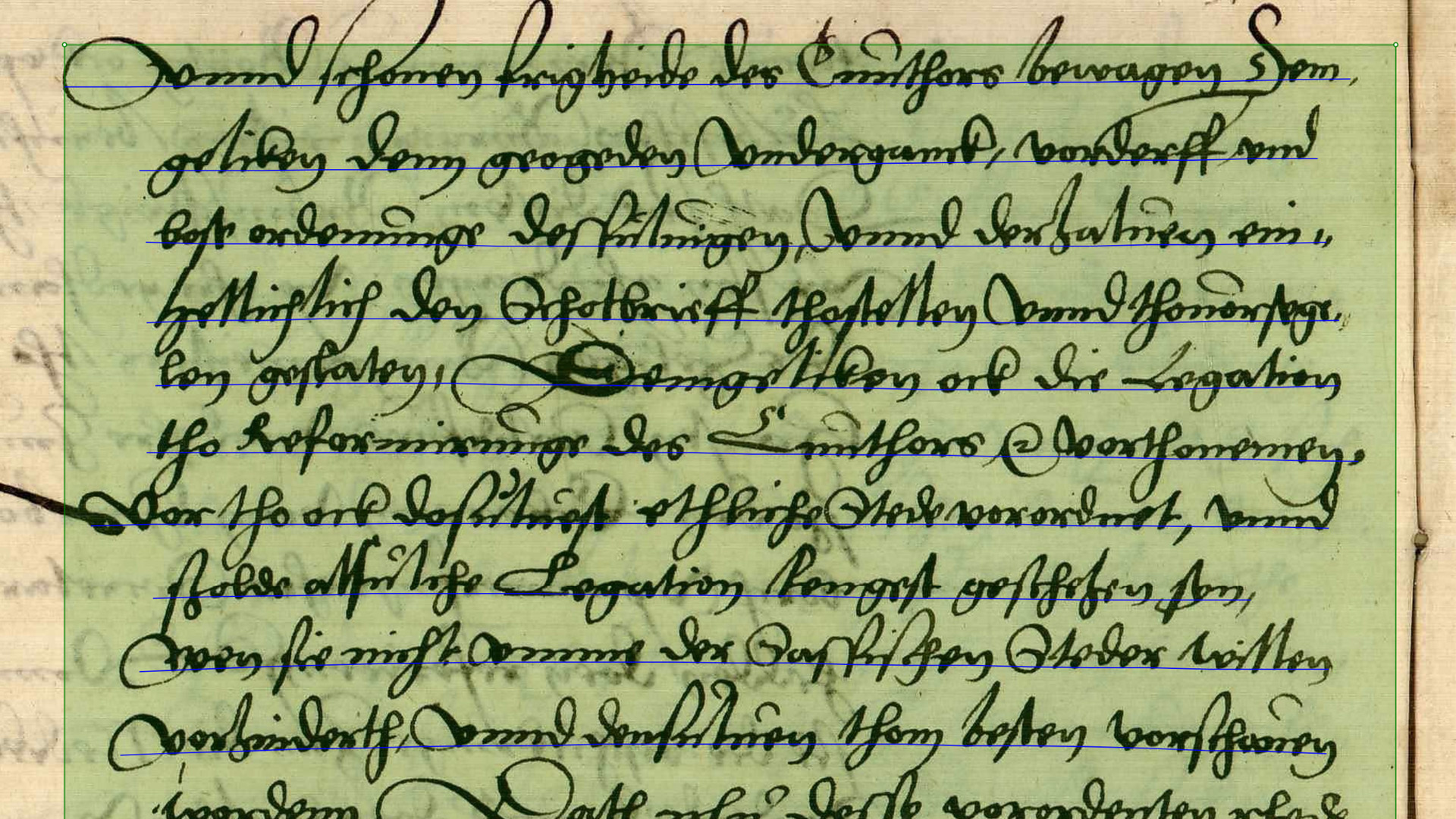
What is Ground Truth?
If you’re new to Transkribus, or machine learning in general, then you are also probably new to the term “Ground Truth”. In shor
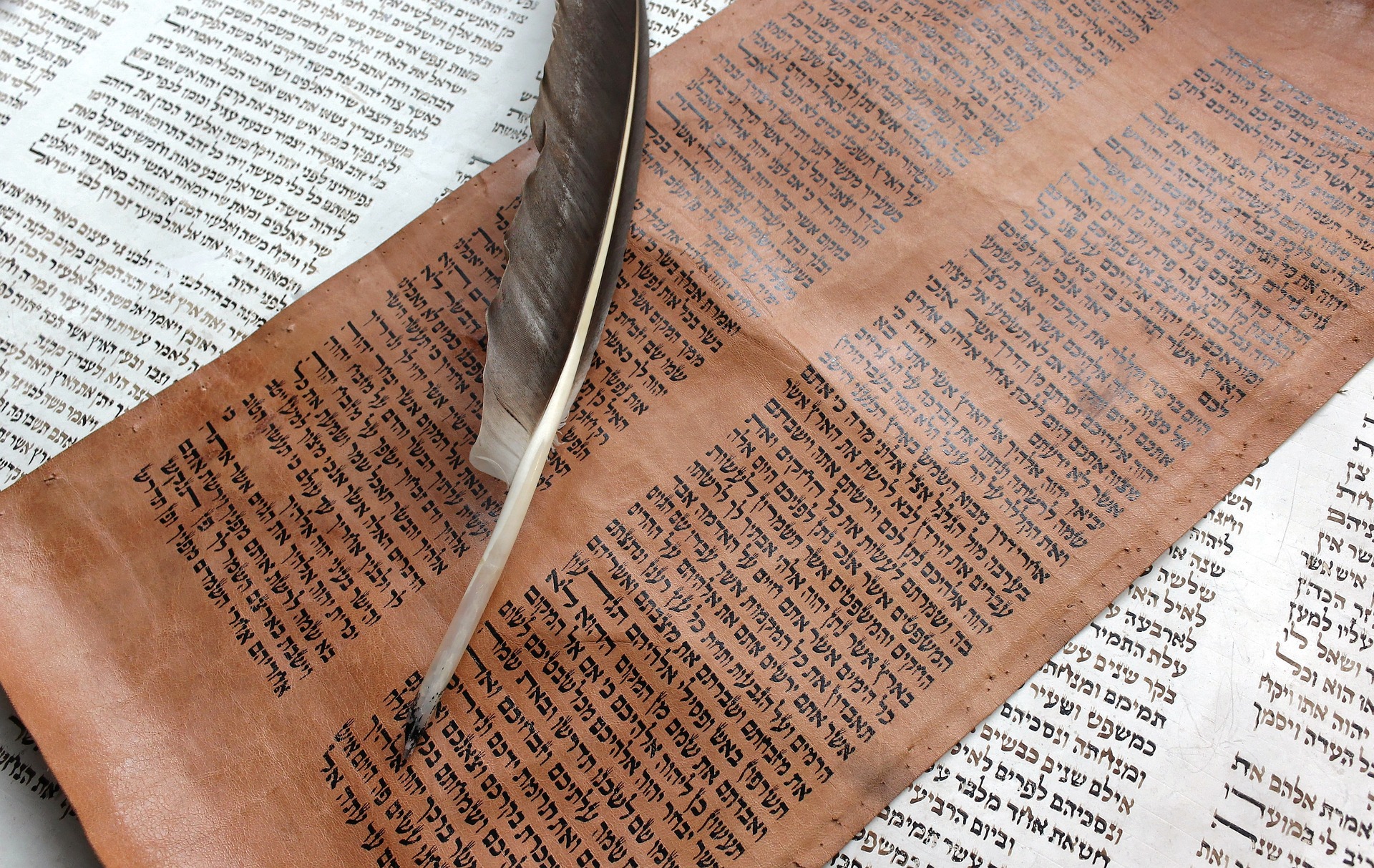
If you scroll through the list of Transkribus’ public AI models, you mi
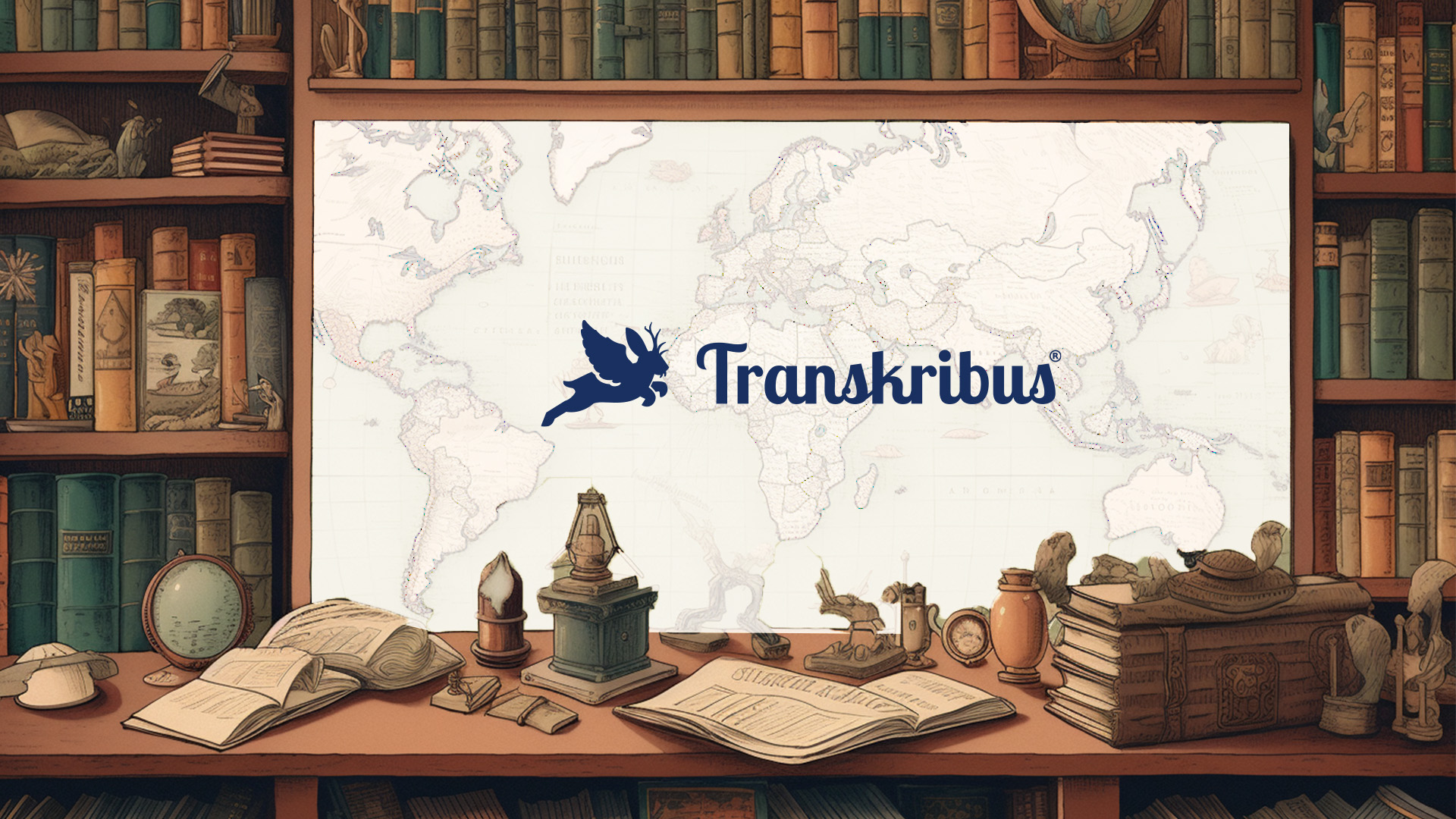
Meet the members of READ-COOP
Did you know that Transkribus isn’t run by an ordinary company but by a cooperative? READ-COOP was set up in 2019 to ensure the long-term developm

You may have heard of the academic disciplines known as the humanities, but what exactly is digital humanit
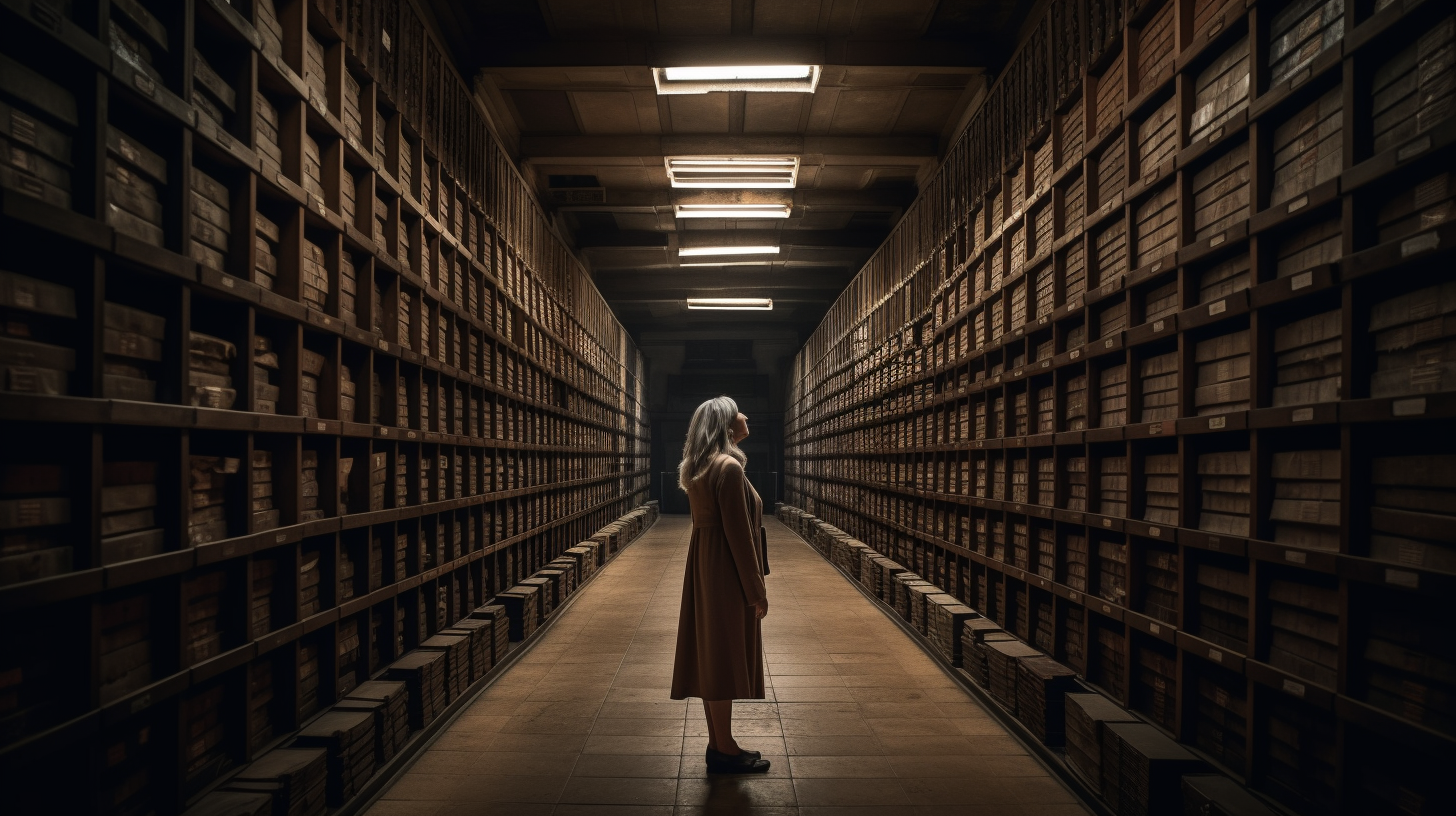
How to digitise archival materials with Transkribus
Think of an archive and you might think of old, dusty basements full of disorganised boxes of papers. But in the technological age, archives are t
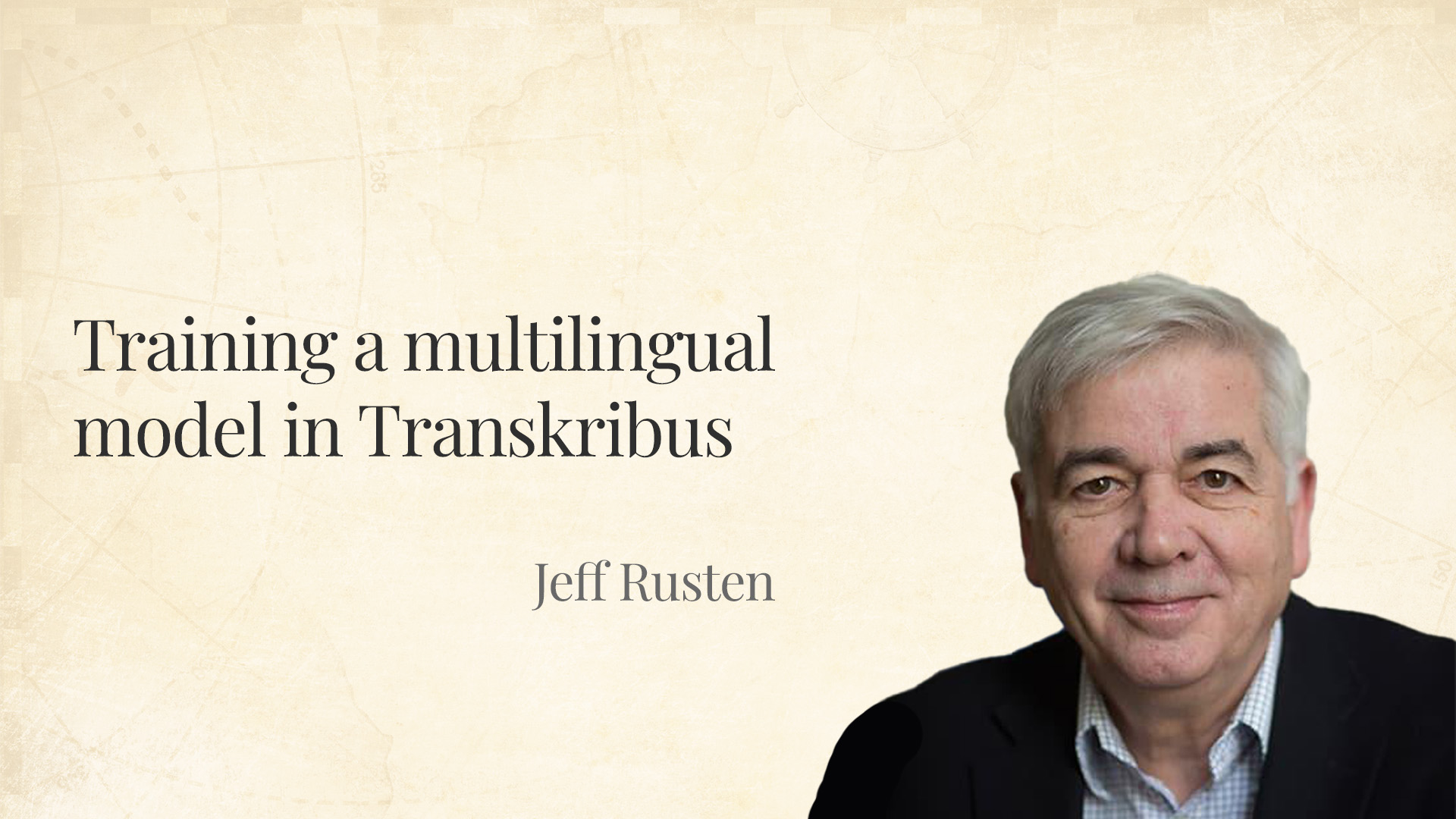
Training a multilingual model in Transkribus: Jeff Rusten
The majority of Transkribus models are also trained to read just one language — after all, most historical documents are written in one language.
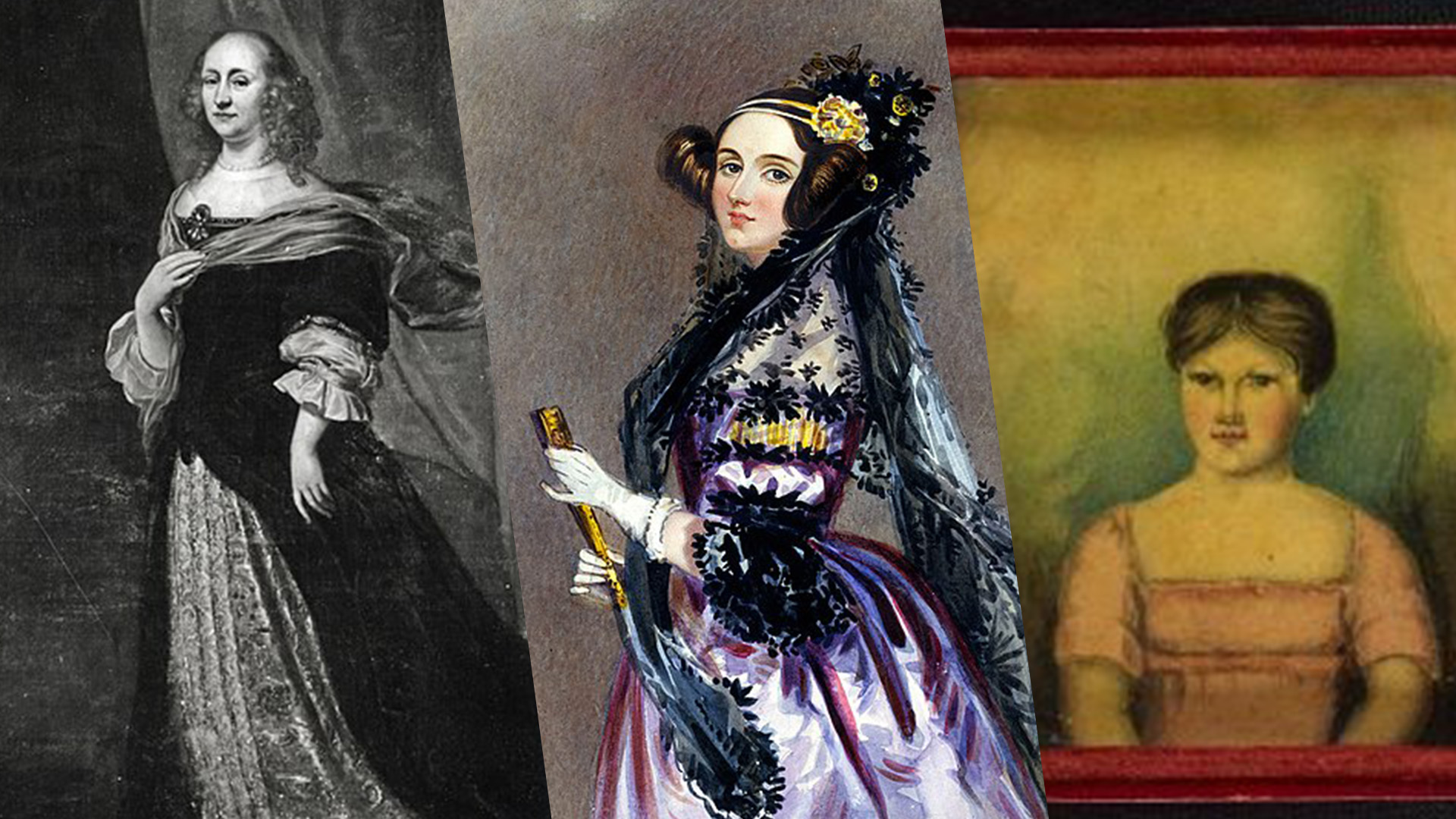
Go to any history museum or read any history book and you’ll find that many of the stories and events revolve

A collaborative approach: READ-COOP and the Europeana Foundation join forces to enhance the Transcribathon platform
By Fiona Park
Not everyone who works with history is a professional historian. From hobby genealogists to volunteers in local museums, l
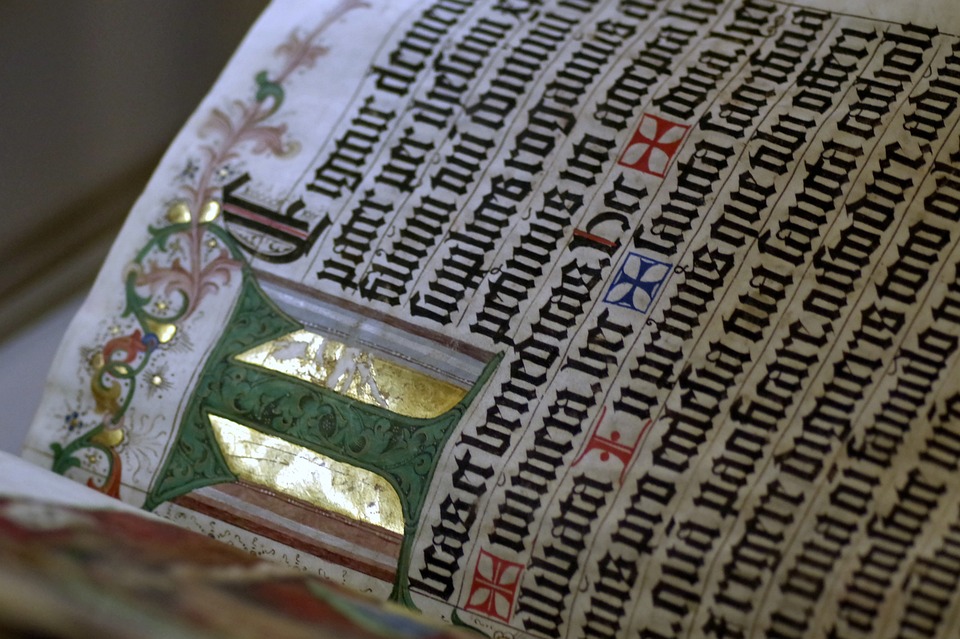
Gold, Gospels and Knights Fighting Snails: An Introduction To Illuminated Manuscripts
Creating books in the Middle Ages was a challenge. Before the introduction of the printing press, all books were painstakingly copied out by hand
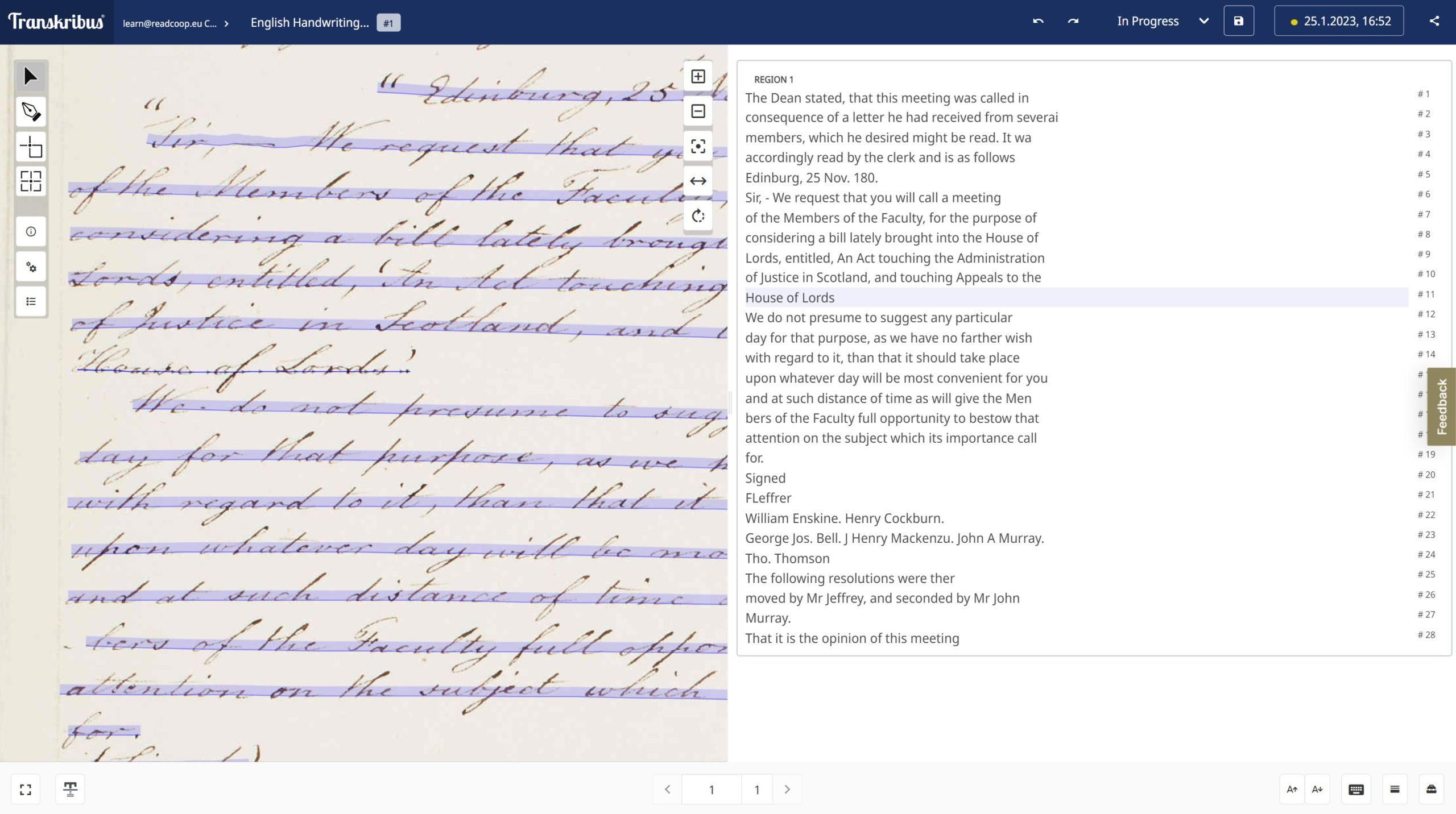
New Document Editor: Enhanced Editing Experience with Unified Editor and Improved Tagging
We are excited to announce the latest version of Transkribus, which includes several significant improvements to our document editor. Below are th

A Short History of Transkribus with Günter Mühlberger
Transkribus wasn’t developed overnight. In fact, it was the result of decades of hard work. And although different people have contributed to Tran

3 AI Models For Transcribing German Text In Fraktur, Kurrent and Sütterlin
If you regularly work with German historical documents then there are three types of German script that you are probably very familiar with: Frakt
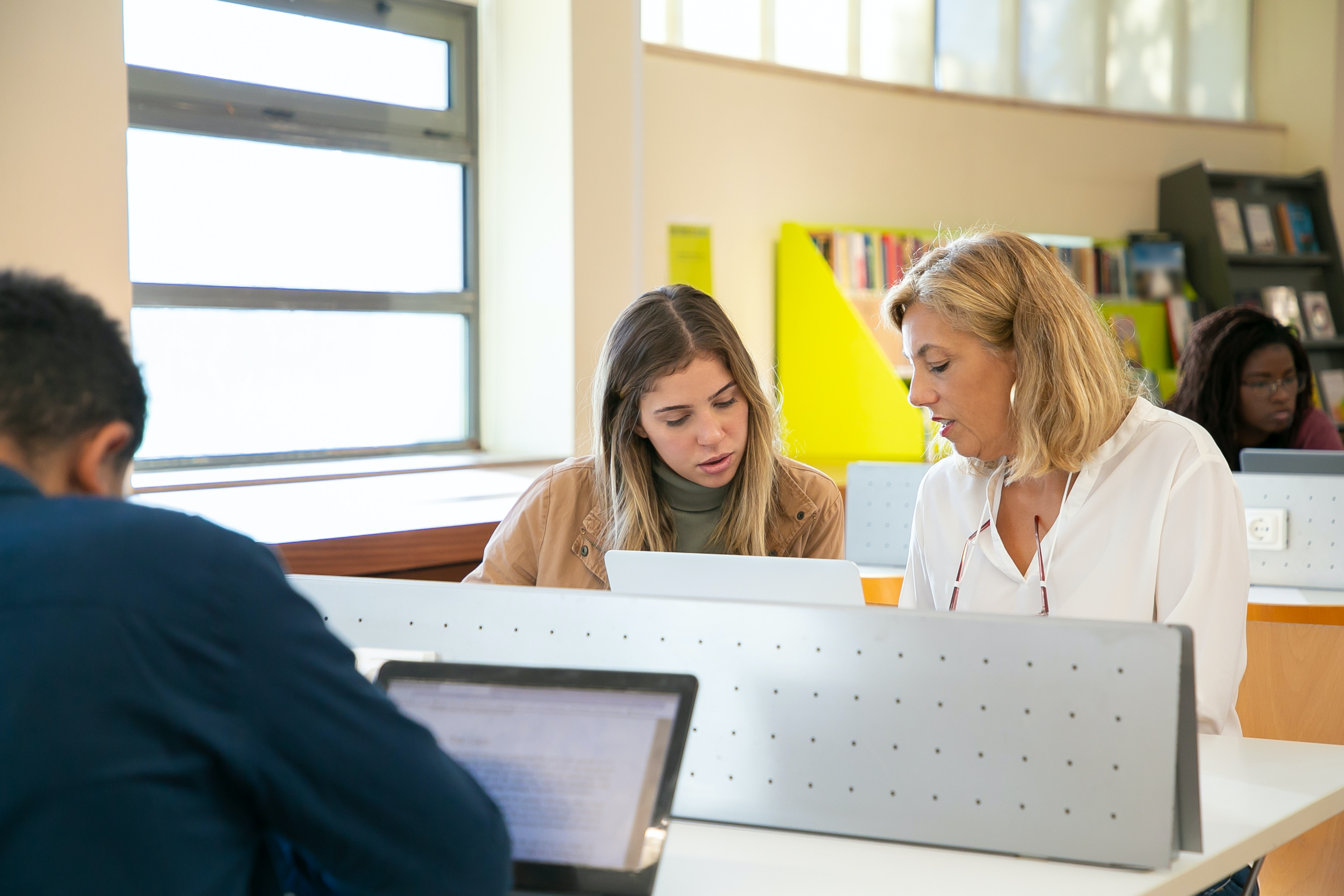
What is citizen science?
Citizen science, community science, crowdsourcing science, volunteer monitoring — however you want to call it, this type of scientific research al

How to organise a successful Transkribus workshop: Jan Odstrčilík
“I want to organise a Transkribus workshop but I don’t know where to start. Could you give me some advice?” This is a common question we get at RE

5 AI Models For Transcribing Old Russian Handwriting And Printed Russian Texts
As one of the world’s largest countries, Russia is also one of the most studied. Its turbulent history and influence on world politics make it the

Try out the new Transkribus Learn: A Tool for Learning How to Read Old Handwriting
Historical documents can be an amazing window into the past, but if you can’t read the handwriting, they can also be frustratingly inacc
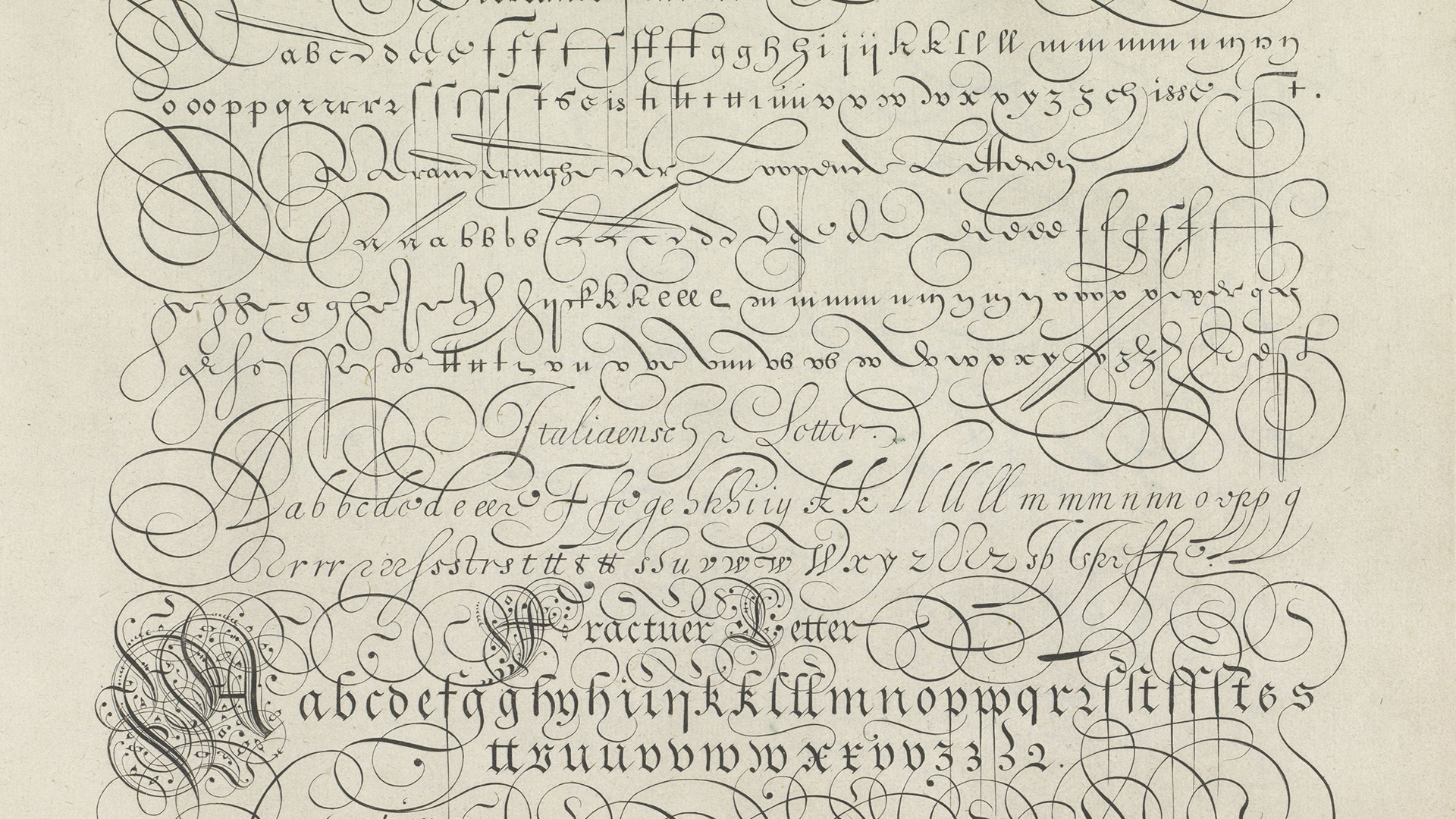
How to read cursive handwriting in historical documents
Cursive handwriting has a rich history. The first people to write cursive letters were the ancient Romans, who used a form of cursive writing call

Take a trip through our written past with the Transkribus 100k Giveaway winners
November 2022 was a milestone month in Transkribus history. After three years as part of a European cooperative, the platform finally reached 100,

100,000+ people use Transkribus (100k Giveaway)
We are thrilled to announce that yesterday, we hit 100,000 users on the Transkribus platform! Even with our years-long highly motivated effort, ad
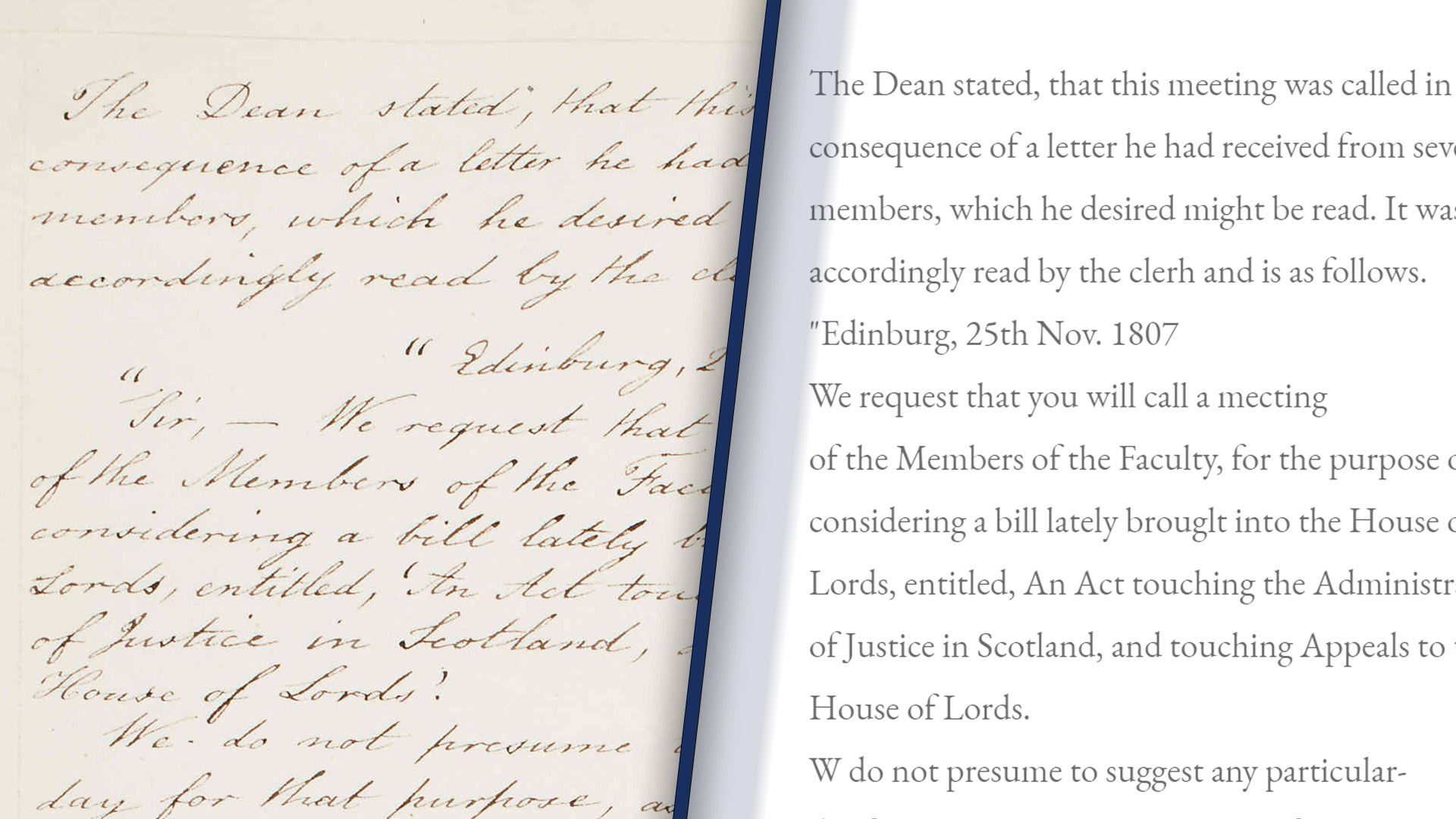
What is handwriting recognition and how does it work?
Ever had trouble reading someone else’s handwriting?
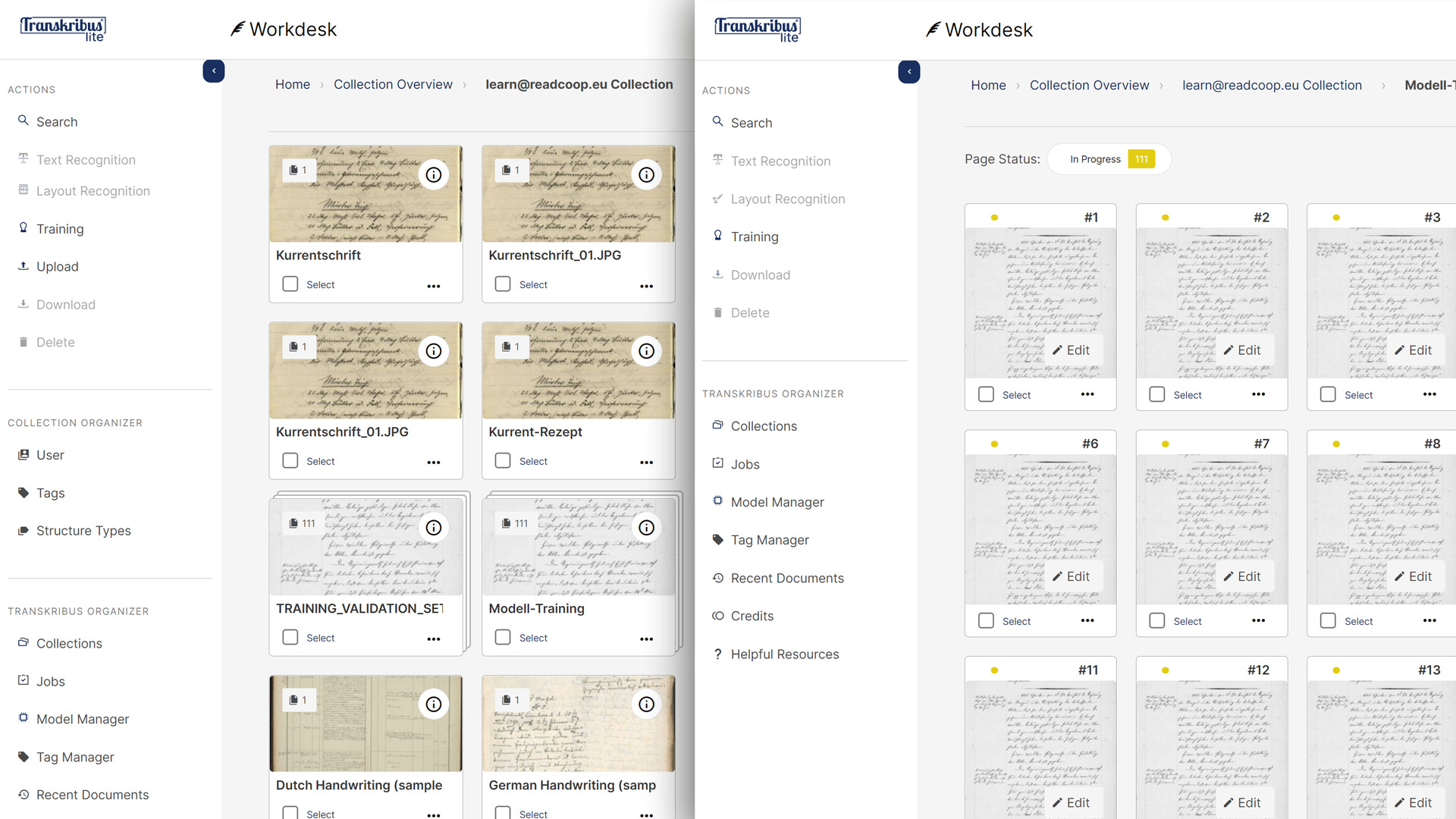
Transkribus Lite 2.3. – New Features: Smart Search, Tag Manager, and Layout Relations
The latest version of Transkribus Lite is here and brings a number of new features. Here are the most important new features:
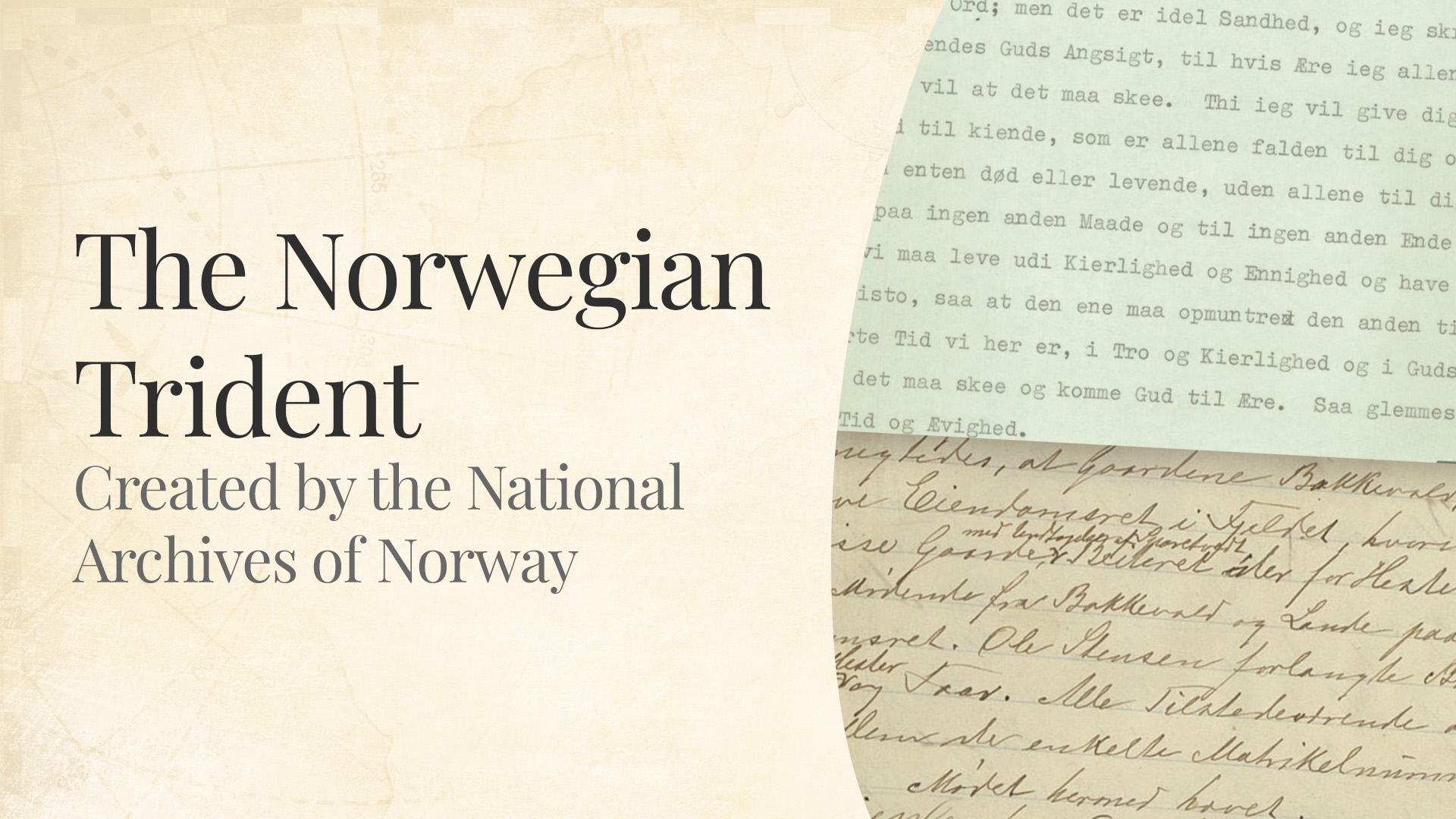
The Norwegian Trident – Three New Public Models For Norwegian (& Danish)
The latest addition to the long list of Transkribus public models comes from the National Archives of Norw

Understanding the application of Transkribus in research
By Joe Nockels, University of Edinburgh
As part of his PhD research at the University of Edinburgh and National Library of Scotland (NLS
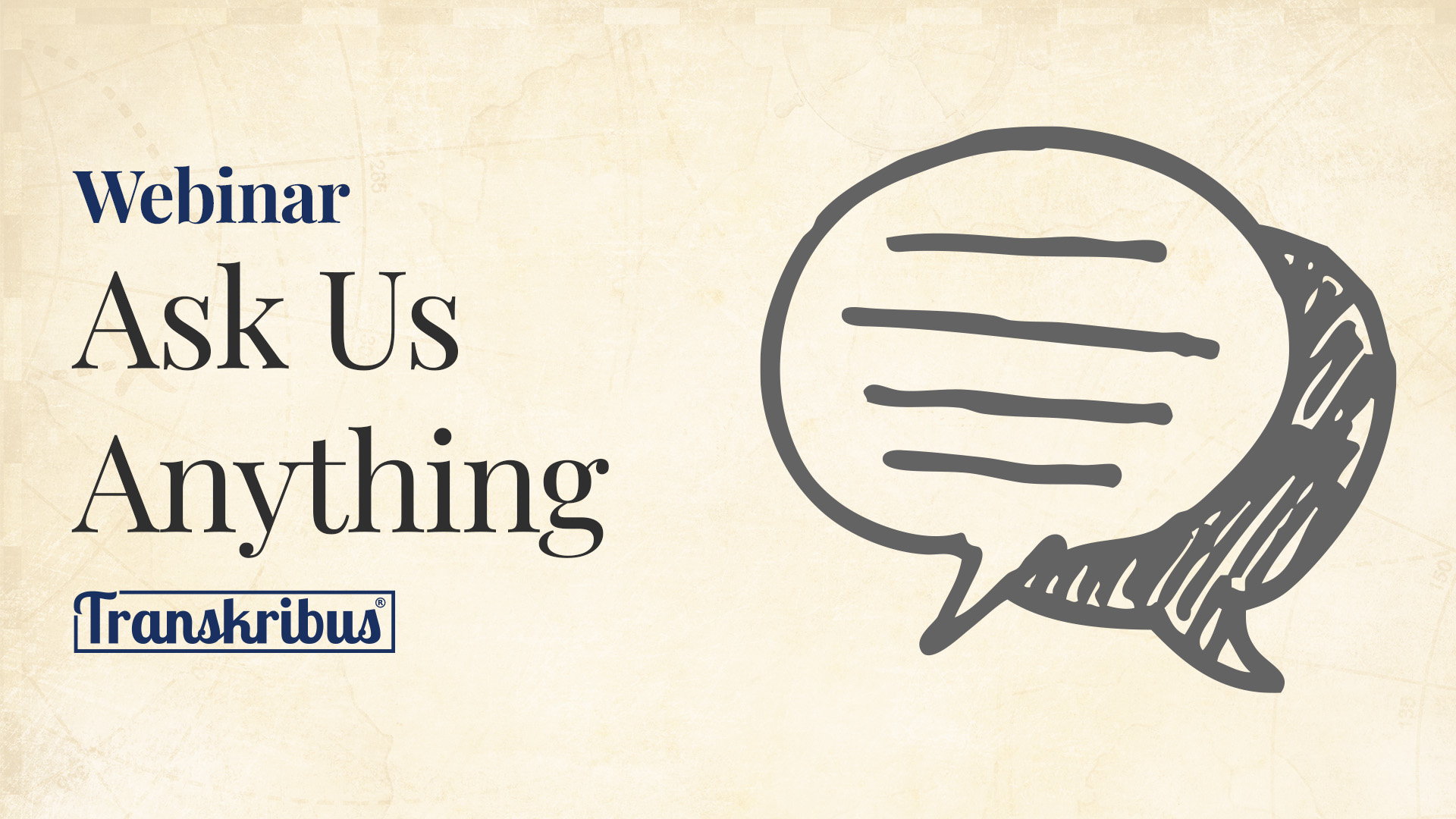
New Webinar: Ask Us Anything About Transkribus
We are excited to launch our new “Ask Us Anything” webinar ser
Transkribus Lite 2.2.: Sharing your work has just got easier
The new sharing feature
It might be a small button for a scre

Archives Who Are Members Of READ-COOP
Many people are surprised to learn that Transkribus is not run by a regular company, but by a cooperative: READ-COOP. That means that it is our me
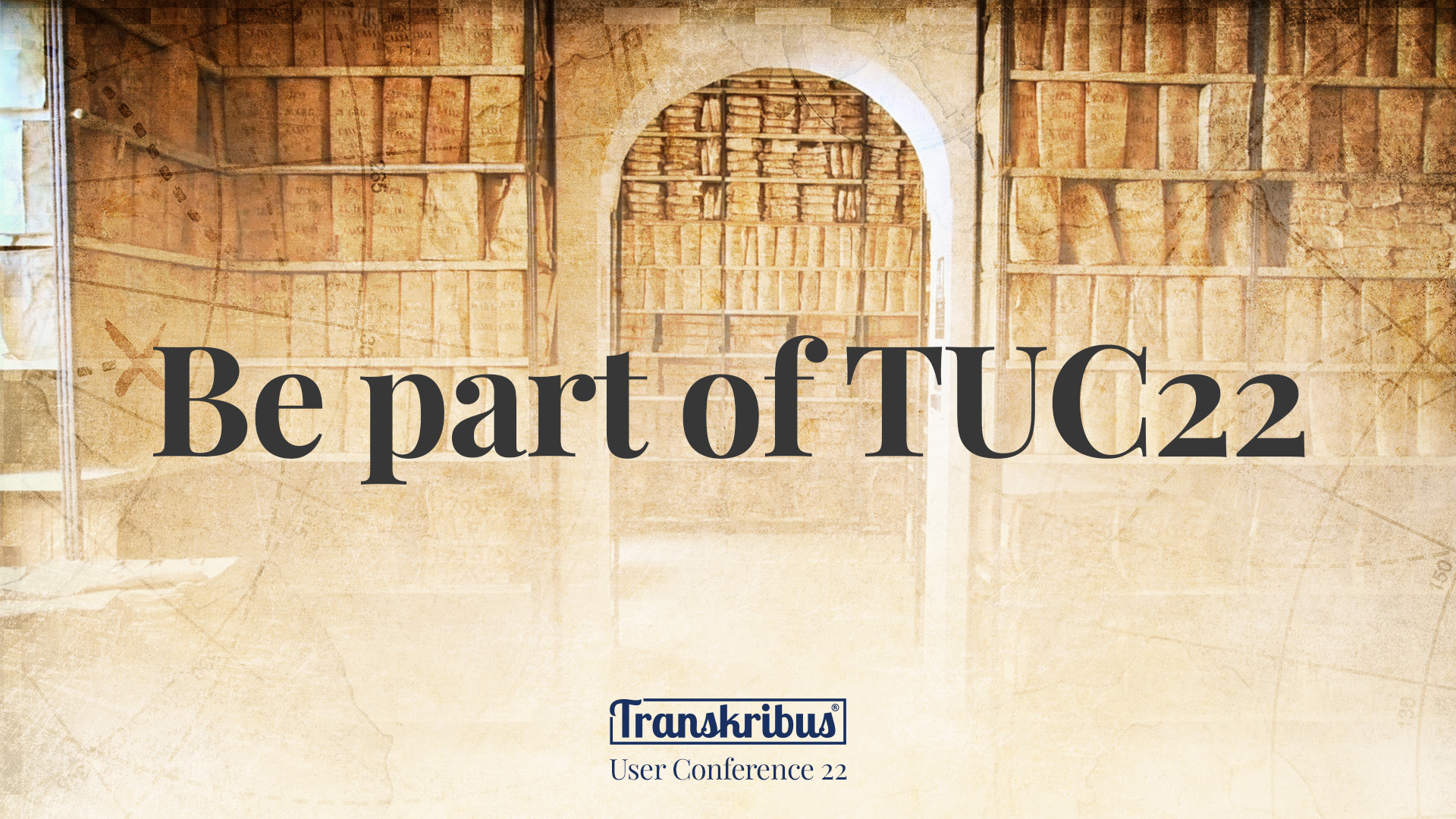
Want to contribute to TUC22? The deadline has just been extended!
The Trankribus User Conference is back! This year, we are once again hosting a live event in Innsbruck, p

New version of nopaque released: now including a Transkribus HTR pipeline
The new version of the nopaque software programme has just been released, now with a completely new Transkribus HTR pipeline.
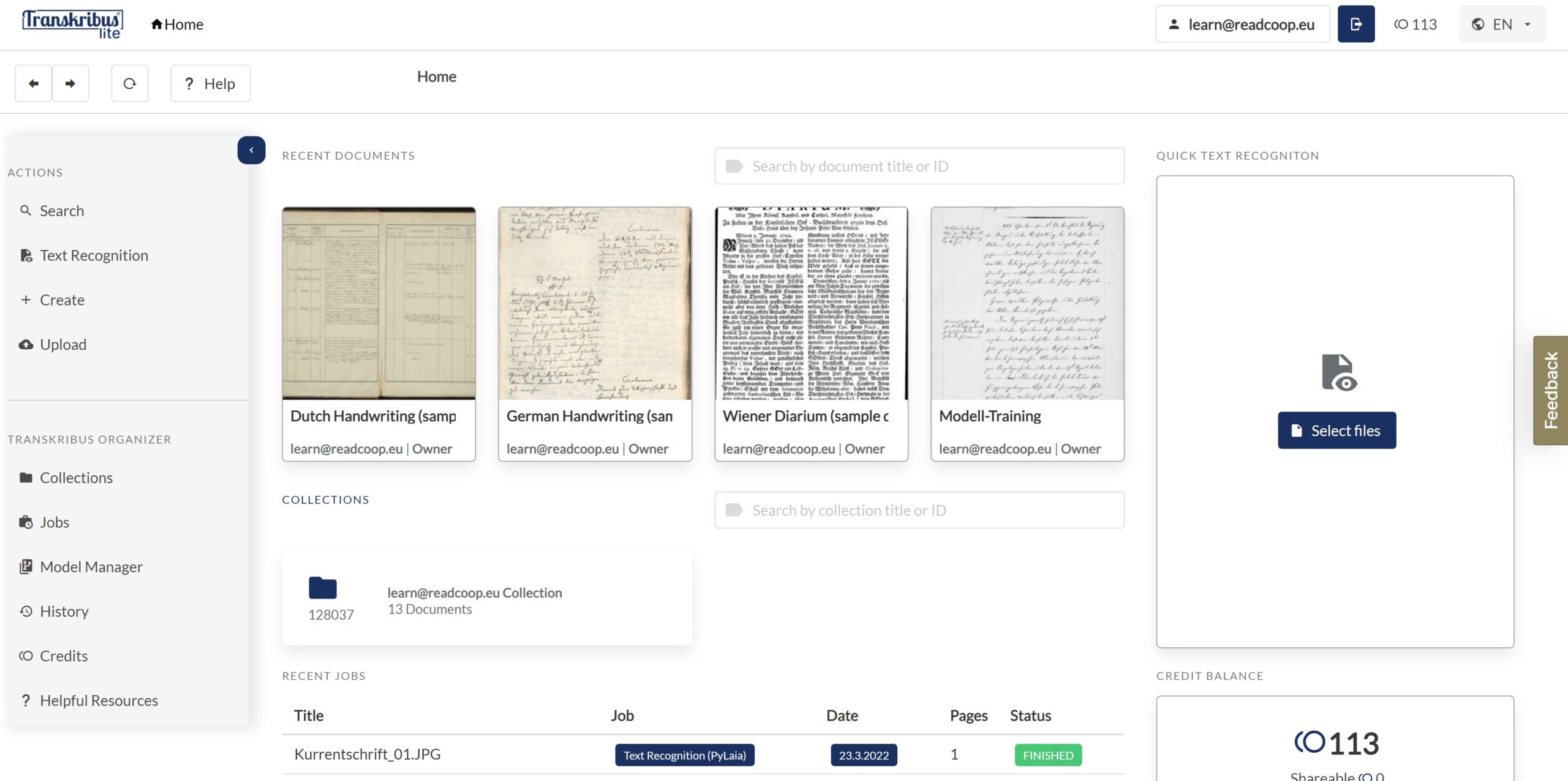
Transkribus Lite 2.1, improved text editor & new models manager
After the successful introduction of Transkribus Lite 2.0, we have now integrated your valuable feedback

We are 100+!
With the start of 2022 we hit another milestone: More than 100 institutions and private persons are now mem
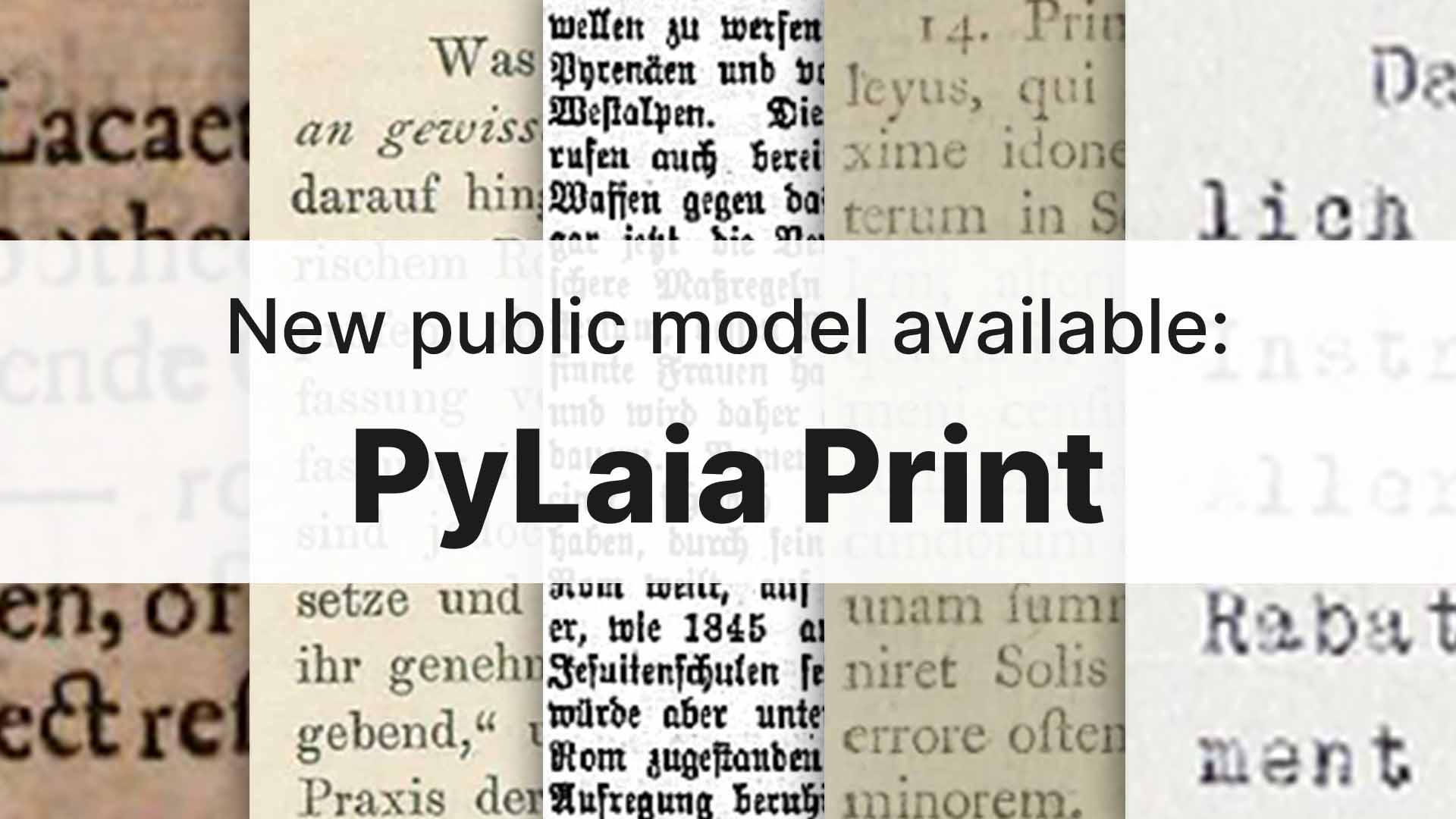
Check out the new PyLaia model for printed text
We are happy to introduce a new PyLaia print model (
Exploring the Dutch Prize Papers
On the Maritime Portal there are several reports on the English archive collection of Prize Papers, documents that British privateers captured fro
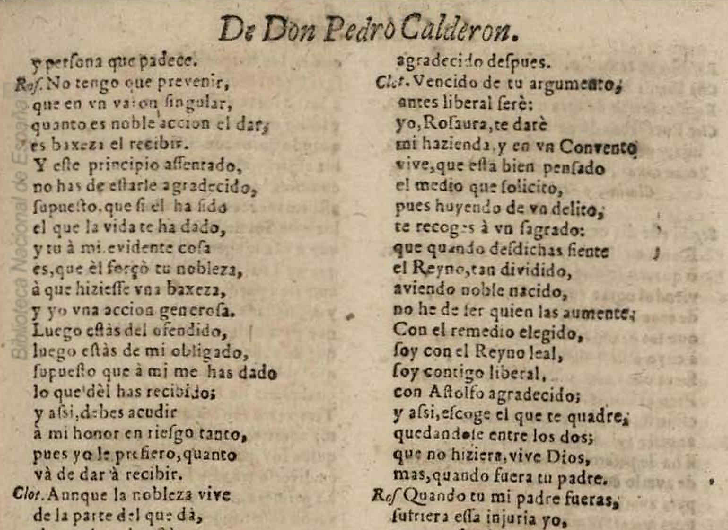
New models out!
Transkribus is happy to introduce new

Mastering Latin Abbreviations and Hyphenations – The Bentham and DEEDS Projects
A collaboration between the Bentham Project of the University College London and the DEEDS (Documents of Early England Data Set) Project of the Un
Understanding Institutional use of HTR: Your experience with Transkribus
Help us to understand the institutional use of HTR: Joe Nockels is working on this project for his PHD (a Scottish Graduate School of Arts and Hum

Supporting Future Scholars: The Transkribus Scholarship Programme
Imagine you are a student who wants to dive into the personal story of one of the few famous child authors in history; or who wants to discover wh
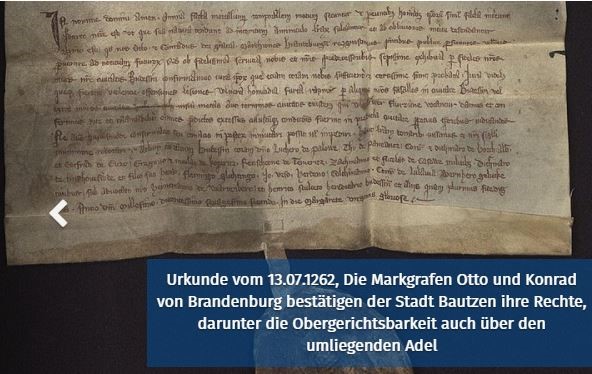
Transkribus at the municipal archive of the city of Bautzen
The municipal archive of the city of Bautzen holds an extensive record of official administration from the 13th century to the present day. Counci
+ Transkribus webinar for the University of Denver Libraries

+ “German_Kurrent_17th-18th” – The Kurrent Jack of all Trades
Already got to know one of our biggest models in Transkribus? That is the German_Kurrent_17th-18th model by the University of
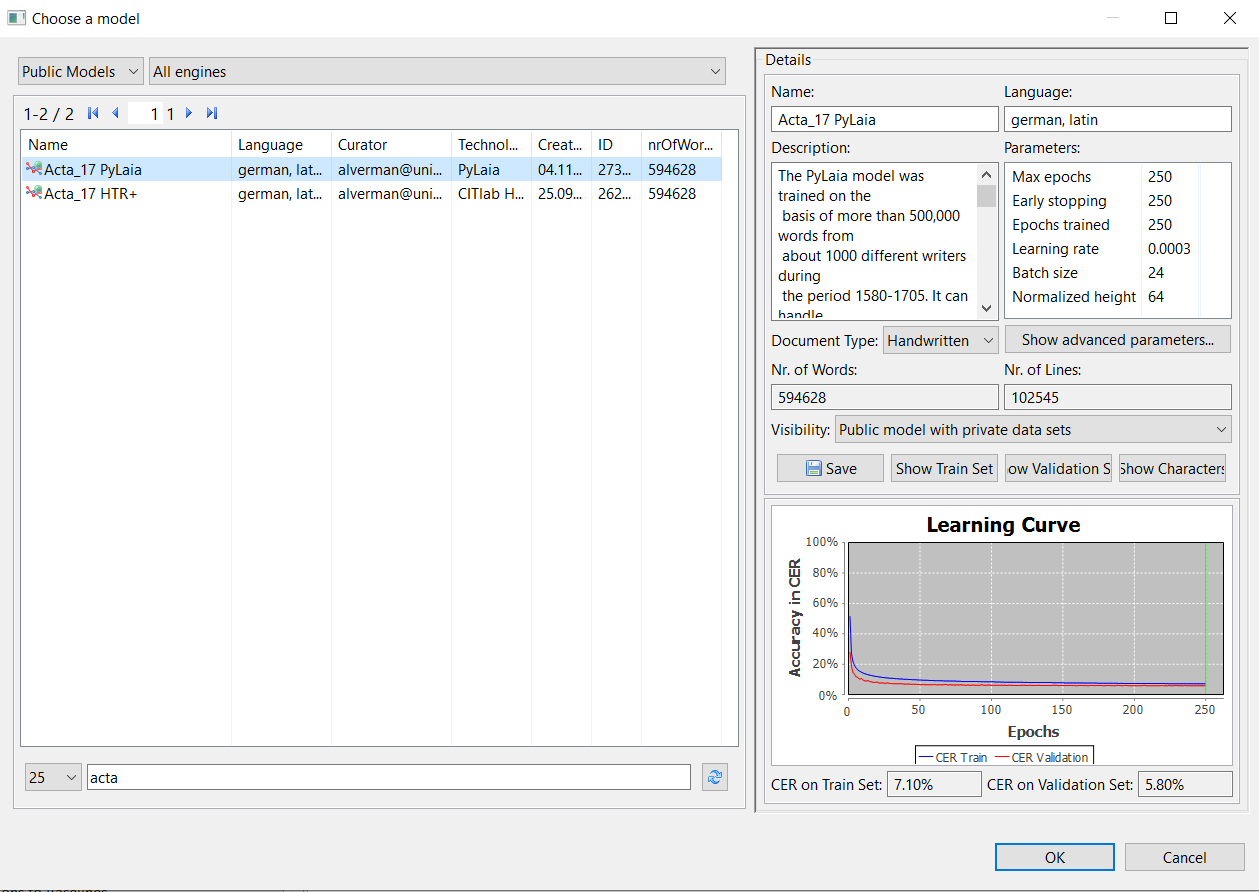
+ Acta_17 – Greifswald Supercharged
Guess who is familiar with a thousand different writers, speaks German, Lower German and Latin and has a favour for 17th century manusc
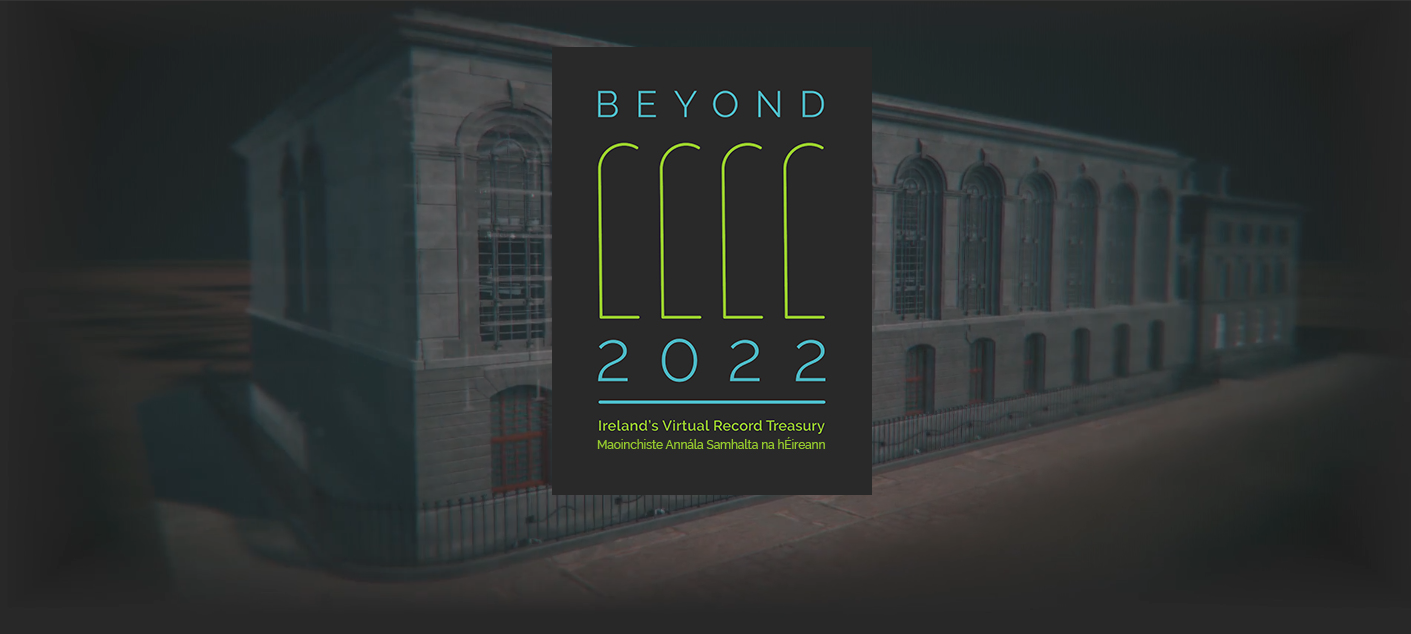
+ Transkribus in the Beyond 2022-project
Beyond 2022 is an exciting project – triggered by a sad accident. In 1922 the Public Record Office in Dublin burned down – and thousands of invalua

+ Distance learning with Transkribus
The Europäische Hansemuseum Lübeck carried out a project with school pupils where the students worked directly on the original sources of

+ Finding out more about undiscovered Hanse-documents with the help of Transkribus
The Hanse-cities, a trade-group from the 13th to the 17th century, have left huge amounts of highly valueable historical doc
+ Chronicling Novelty: A great crowd-sourcing project from the Netherlands
A digital future for old news
Two years ago, Erika Kuijpers (Amsterdam University) in collaboration with Judith Pollman (Leiden Universi
+ Try out Transkribus new recognition software PyLaia!
Some of you might already have come across the word “PyLaia” in connection with Transkribus. Actually, it is one more recognition engine, which ha
+ Entangled Histories Ordinances of the Low Countries
In 2019 the KB National Library of the Netherlands welcomed the
+ Public model for Italian administrative hands
We are happy to present a new public model for Italian administrative hands! It was created as a collaborative effort by Jake Dyble (Exeter/Pisa),
+ Students up for a research competition?
We would like to make you aware of the Innovation in Archival Research Prize, that is organised by the National Archives of the Netherlan
+ More than 60 members already support the READ-COOP SCE
The Transkribus community keeps growing, we have passed the 40.000 users mark recently, and so does the numb
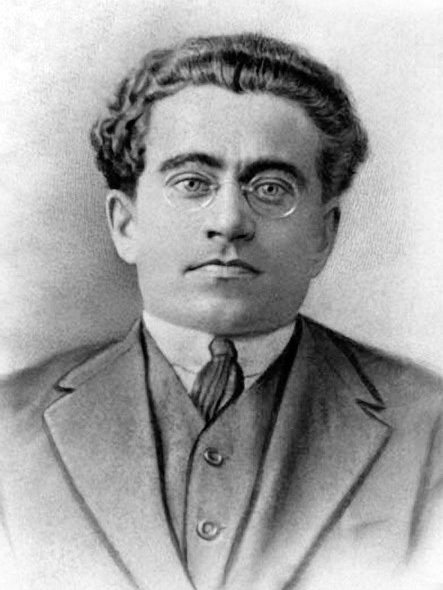
+Transkribus e le frontiere dell’analisi elettronica dei testi
Recently an interview on the experience with Transkribus has been publicised by the Gramsci centre for the humanities and the University
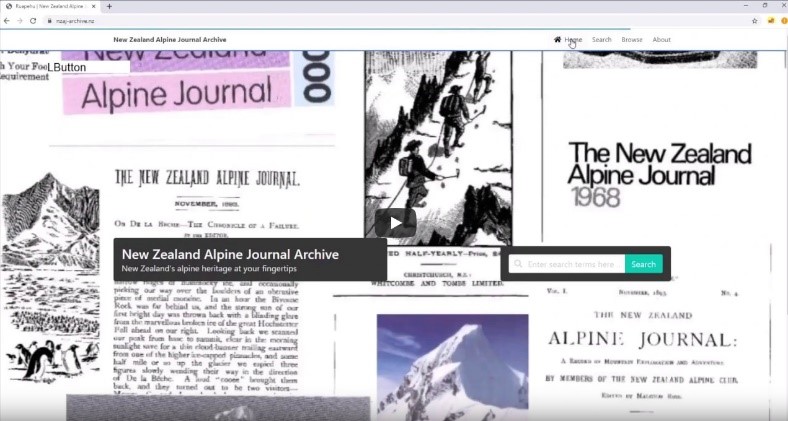
+ Videos on Keyword and Full-Text search interfaces
Want to know, what a searching interface based on Transkribus can look like? We have two new demo videos available on that in our Youtube-channel
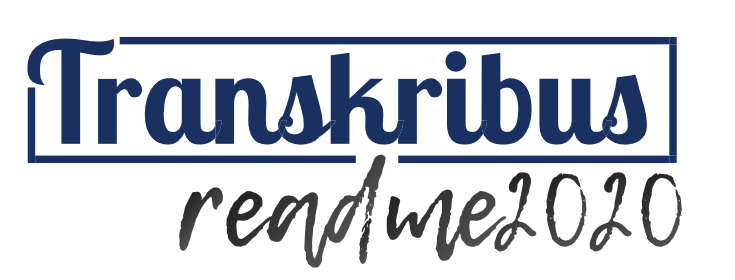
+ readme2020: crowdsourcing for the recognition of modern handwritings
Many models on different languages of various epochs have been trained in Transkribus already. What we are still missing is a general model, which
+ Widecombe Parish Devon UK: Investigating Local Welfare Provision
This project was set up to investigate the local parish records of Devon, some of which date back to the 16th century but the majority
+ Handwritten Text Recognition (HTR) for damaged archives
We would like to inform you about an article written by Marco Roling, which has been published in March 2020 and is dedicated to experiments about
+ Deciphering the letters of Andrej Kmet’ with the help of Transkribus
In the article with the title “Automated Transcription of Handwritten Text: READ and TRANSKRIBUS (An Experiment with Transcribing Letters of
+ Train the trainers in Innsbruck
We from the Transkribus-team keep noticing interest amongst ambitioned users of Transkribus in giving Transkribus-workshops and this way share the
+ Proudly presenting the Dutch giant
This is what comes out, when two Transkribus power user archives, namely the Amsterdam City Archives and the National Archives of the Netherlands
Transkribus User Conference 2018
The second Transkribus User Conference took place at the Technical University Vienna on 8-9 November 2018. Around 120 attendees shared their expe
Transkribus User Conference 2017
The first Transkribus User Conference took place at the
Transkribus User Conference 2020
Our 3rd Transkribus User Conference will take place at the University of Innsbruck on 6-7 February 2020. Information will be shared about our rece
+ Scanathon at the University Archive Greifswald
We are happy to report about the Scanathon, which took place at the University of Greifswald as part of their open house day on Saturday, 7th of Ma
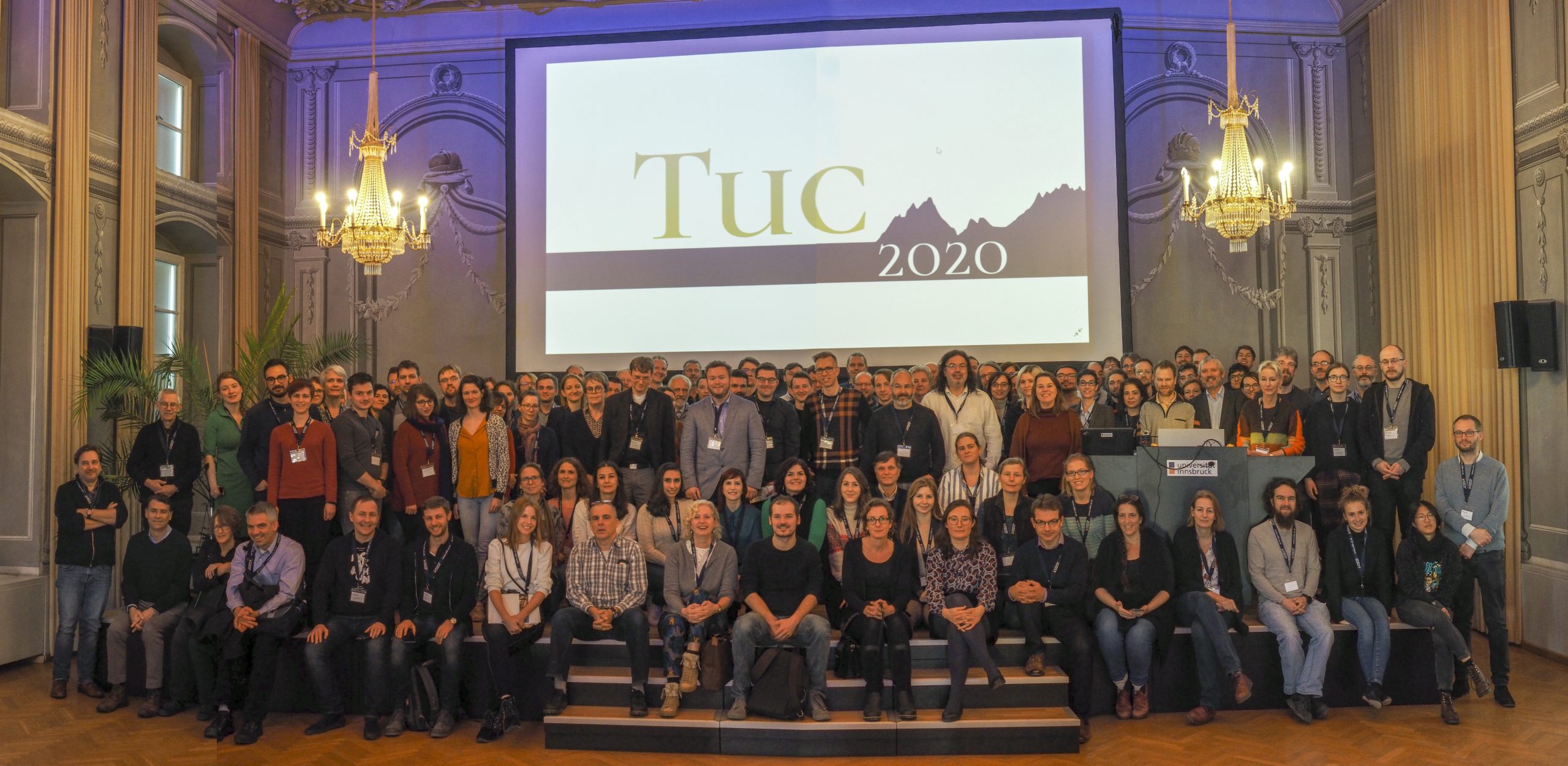
+ Transkribus User Conference 2020 – we keep transcribing as READ-COOP
On 6-7 February 2020 the third Transkribus User Conference took place at the Faculty of Catholic Theology in Innsbruck. 160 Transkribus users made
+ Ernie O’Malley Interviews Project’s about Transkribus
From the 1930s until 1953 one veteran of the Irish Revolution (1912-23), Ernie O’Malley, interviewed over 450 of his former comrades about their ex
+ Presenting the Noscemus-public-model
We are happy to present one of our public models, which is the “Noscemus GM v1”-model released by Stefan Zathammer as part of the Innsbruck based
+ Public models: try out new ones and publicise your own!
We are excited to announce that new models had been made available to the Transkribus crowd recently. Getting closer to our goal of being a platfor
+ READ-COOP SCE formally established!
The READ-COOP SCE with limited liability is now formally established! Under the identification number FN 520187g it is registered in the Austrian c
+ Printed vs. handwritten text lines – automatically separated
The Transkribus team collaborates with the Pattern Recognition team of the University Erlangen-Nürnberg (also member of READ-COOP SCE) and the coll
+ Digitisation blog of the University Archive Greifswald
Dr. Dirk Alvermann of the University Archive Greifswald is one of the pioneers of Transkribus. He already started working with the first version of
+ Paper on Transkribus and handwritten text recognition (HTR) in archives now open access
A general paper about Transkribus was published in the Journal of Documentation.
+ Successful Transkribus Workshop at DH summer school in Tartu
On 27th of August Barbara Denicolò of the Transkribus Team Innsbruck held a workshop at the summer school “Digital Methods in Huma
+ Decoding famous British engineer’s handwriting
The SS Great Britain trust accepted the challenge of deciphering Isambard Kingdom Brunel’s handwriting. Without technical help this had been a chal
+ National Archives releases first version of a Dutch handwriting model
The digitisation team around Liesbeth Keyser from the National Archives in the Netherlands is workin
+ Special models on Slavic handwriting released
Prof. Achim Rabus from the University of Freiburg has release
+ General model for “Fraktur” released
Thanks to the Library Labs of the Austrian National Library and the
+ In preparation for the next Transkribus User Conference
We are excited about our next Transkribus User Conference, which this time will take place in Innsbruck. Preparations are in full swing and the dat
+ Transkribus HTR competing in OCR-test of the Zurich University
Members of the Zurich University compared two versions of the ABBYY FineReader (FineReader XIX and FineReader Server 11) OCR (Optical Character Rec
+ Foundation of READ-COOP
On 1st of July 2019 the READ project will turn into a European Cooperative Society (SCE). READ-COOP will serve as the basis for sustaining and furt
+ Transkribus goes America
In May, Barbara Denicolò from the Transkribus-Team Innsbruck and Elena Mühlbauer from the Diözesanarchiv in Passau in the name of READ travelled to
+ Handwritten Text Recognition at the National Archives of Finland
In the past 3 years research groups and archives from all over Europe were working on Handwritten Text Recognition for historical documents. Result
+ HTR+ reads old Slavonic documents with 3-5 % Character Error Rate
Recently our new HTR+ was tested on different styles of Church Slavonic handwritings by Achim Rabus, who is holding the Chair of Slavic Linguistics
+ Transkribus-support for DIGITENS
Transkribus now helps to produce a digital encyclopaedia, containing articles regarding sociability during the Age of British enlightenment. This s
+ First meeting of Dutch Transkribus network
On 4 April 2019 Transkribus users from the Netherlands and Belgium gathered under cloudy skies in The Hague to discuss the possibility of forming a
+ Searching more than 100 years of mountaineering history with Transkribus
We are proud to be part of a successful project carried out by the New Zealand Alpine Club and the Universi
+ Crowdsourcing with Transkribus at Amsterdam City Archives
When we work together, there’s so much we can achieve!
+ 20,000 tremendous Transkribus users!
Our latest milestone has put a big smile on our faces – there are now over 20,000 registered users of our
+ Plant power! Results from the Royal College of Physicians’ Herbarium
The Royal College of Physicians has been devoted to advancing
+ Transkribus featured in Italian newspaper
Another day, another news feature for Transkribus! il Fatt
+ Birth of the First Republic: Recognising Austrian Parliamentary papers
After the tumult of World War One, the First Austrian Republic was declared in September 1919. Nearly 100 years later, the Austrian Parliamentary D
+ Learn how to read historical handwriting with Transkribus Learn
We’re sure many people know how challenging it can be to read historical manuscripts. Our new e-learning website,
+ Crowdsourced digitisation with DocScan
At the READ project, we believe in using cutting-edge technology to help people study a rich variety of historical documents.
The
+ Transkribus around the globe – coverage on TVNZ
Our Transkribus platform for Handwritten Text Recogniti
+ Medievalists! Share data with our working group to improve Handwritten Text Recognition
With thousands of Transkribus users working all over th
+ READ on the move to READ-COOP
The READ consortium together with several other institutions is currently preparing the foundation of a legal entity (working titl
+ Learn how to add structural tags to documents in Transkribus
We have another new How to Guide for users of our Transkrib
+ ScanTent makes it to Mali, West Africa!
Prototypes of the ScanTent, our device for digitising documents wit
+ Latest Transkribus video tutorials
We’re celebrating the New Year with the release of several video tutorials designed to help new users navigate our
+ Meet the READ project partners Johanna Walcher
What’s your name?
Johanna Walcher
+Sharing data for Handwritten Text Recognition
At the READ project we are committed to sharing data and working collaboratively to improve the recognition of handwritten historical documents.
+ A new video tutorial helps with segmentation in Transkribus
Segmentation is a crucial stage of working with Handwritten Text Recognition in our
+Transkribus How to Guides now available in German (and French)
Many new users are registering for a Transkribus accoun
+ Preserving our cultural heritage with a smartphone
The READ project is a big proponent of digitisation on demand using smartphones.
A typical mobile phone camera can capture relatively high-q
+ Searching the Spanish Golden Age with Keyword Spotting
In sixteenth- and seventeenth-century Spain, there was a significant surge of thousands of theatrical productions. This period has become known as
+ Recognising eighteenth-century legal records at Middle Temple
The Honourable Society of the Middle Temple is one of four Inns of Court: prestigious professional a
+ Working with (Early Modern) Dutch script? Join a new Transkribus working group!
by Annemieke Romein, University of Ghent
(Dutc
+ From Foucault to our future – Transkribus User Conference 2018
On 8-9 November 2018, Vienna was overtaken by more than 100
+ New Transkribus transcription conventions now available
We know that handwritten historical documents are often complex in their structure and content.
+ Wandering around baroque Naples – The Pandetta project by ilCartastorie.
by Sergio Riolo, il Cartastorie
+ More than 15,000 Transkribus users!
Drumroll please! Transkribus now has more than 15,000 users! Our users are based mainly in Europe but also extend into Africa, Australia, America
+ Experiments with Transkribus and early printed text
We love hearing what our users have been getting up to with our
+ Searching Jeremy Bentham’s manuscripts with Keyword Spotting
The Bentham Project has been experimenting with the Handwritten Text Recognition (HTR) of Bentham’s manuscripts for the past five years, first as a
+ New to Transkribus? Master the platform in just 10 steps
Maybe you’ve just discovered Transkribus and are feeling a bit overwhelmed? Our updated video should help you get to grips with working with
+ Sharing data with Transkribus – Transcribimus and minutes of Vancouver City Council
We can all agree that it’s nice to share – and in the READ project, sharing data brings direct benefits for the Handwritten Text Recogn
+ Learn more about Transkribus in Zagreb
Join us for an event in the Croatian capital of Zagreb on Thursday 18th October.
The event is hosted by
+ Join us for Vienna Scanathon at the Austrian Academy of Sciences
Digitising historical documents? There’s an app for that!
Join us in Vienna for our next Scanathon event, hosted by the
+ Registration now open! Transkribus User Conference 2018
Registration for the 2018 Transkribus User Conference in Vienna is now open!
+ Unleashing the Trankribus API
by David Brown and Stephen Crane, Trinity College Dublin
On 30 June 1922, at the outset of the Irish Civil War, a
+ Transkribus – The Best Idea to Procrastinate I’ve Ever Had
Stefan Karcher, a graduate student at Heidelberg University has
+ Eighteenth-century medical casebooks – transcribed with Transkribus!
William Hey (1736 – 1819) was an English surgeon who worked at Leeds General Infirmary, served as mayor of Leeds and as president of the Leed
+ Reading admiral de Ruyter’s journal – using existing transcripts to train Automated Text Recognition
+ Working with tables in Transkribus? Help has arrived!
Record books, registers, accounts – these are just a few of the hundreds of archival documents that can be laid out in tables and forms. Alt
+ New Facebook group for Transkribus users
Transkribus users may like to join a new user-led Facebook group set up by
+ New resources for German-speaking Transkribus users
A quick announcement about some new German language resources for users of our
+ Transkribus recognises early modern German correspondence
The Gender History research group at the University of Jena (Thuringia, Germany) have been experimenting with Transkribus as part of a
Working with Gothic script? Join a new Transkribus working group!
Gothic scripts from the Middle Ages can be found in archives and libraries all over Europe. The script was widely used for hundreds of years, and
+ New article on automated transcription and search of seventeenth-century document
The Pattern Recognition and Human Language Technology research gr
+ Transcribing Foucault’s handwriting with Transkribus
In exciting news, Transkribus has started to tackle the papers of the seminal French philosopher Michel Foucault.
The team at the
+ Report from the 2018 Scanathon
On Friday 8 June 2018 there was a flurry of READ activity in London, Helsinki and Zurich as we held our first ever international Scanathon! We dec
+ Transkribus on the road with the University Library of Belgrade
Congratulations go to the University Library of Belgrade (on
+ Join READ and Transkribus at Bibliotheca Baltica conference
Registration is now open for an upcoming libraries conference where you’ll be able to hear from some of the READ project partners and see how
+ Transkribus appears on Heise online!
‘Transkribus deciphers your Grandma’s handwriting’ declared the headline of a
+ Meet the READ project partners – Maria Kallio
What’s your name?
Maria Kallio
+ Time Machine takes one step closer to FET Flagship success
The Time Machine is a pioneering digital humanities initiative which
+ Train your own Handwritten Text Recognition model!
Our Transkribus platform offers access to cutting-edge
+ Join us at the 2018 Scanathon in London, Zurich and Helsinki!
The READ project is organising an exciting international Scanathon on Friday 8 June 2018, with parallel events taking place in Finland, Switzerland
+ English Cycling diaries recognised by University of Warwick
We’ve got some terrific results to report relating to an interesting collection of documents held at the
+ Join a Transkribus working group for legal documents
MarineLives is a digital volunteering project,
+ Transcribing wills at The National Archives (UK)
We’re always delighted to hear updates from Transkribus users about their progress!
+ International Workshop on Document Analysis Systems (DAS)
The 13th edition of the International Workshop on Document Analysis Systems (DAS) is taking place at the TU Wien.
From Wednesday, April 25th
+ Help us process tables in Transkribus!
Information laid out in tables often seems very neat to the human eye but computers can struggle to process the tables that appear commonly in hist
+ Keyword Spotting: search handwritten documents with Transkribus!
Transkribus can automatically produce transcripts of historical material with very impressive results, where 90-95% of characters in a given transc
+ Document Analysis Systems workshop in Vienna
One of the major workshops for computer scientists working in the fields of Document Analysis will take place in Vienna on 24-27 April 2018.
+ What’s new in Transkribus?
Automated Text Recognition technology is fast-paced and improving all the time. The
+ Read our 2017 reports!
If you want to know more detail about the research, services and network building being undertaken by the READ project, our
+ Save the date! Next Transkribus User Conference, 8-9 November 2018
The first Transkribus User Conference<
+ Transkribus volunteer tackles Danish handwriting
There are now thousands of Transkribus users working wi
+ Learn about Transkribus at a Digital Archives workshop in London
If you are in London on 21 March, come along to a free workshop at the
+ Recognising Linnaeus’ handwriting
The Linnean Society of London has recently produced some promising
+ New and improved Transkribus How to Guides!
We’ve given the Transkribus How to Guides a reboot! New and improved guidelines are here to help Transkribus users achieve the automated tra
+ New project working with Transkribus – the Imperial Library in Vienna
An exciting new project that will work intensively with Transkribus has just launched, thanks to funding from the
+ Teach yourself to read historical handwriting with Transkribus Learn!
For anyone who has ever struggled to decipher a word in a manuscript, help is at hand! The first version of our new e-learning app,
+ Blog post from The British Library – Handwritten Text Recognition of India Office Records
The British Library, one of the READ project’s
+ 2017 – a good year for the READ project!
It’s hard to believe it but we’ve entered the third year of the READ project! Like most of the world, we’re using January as an
+ READ on the radio in Serbia!
Transkribus and the READ project have been featured on national radio in Serbia! Our partnership with the
+ Latest new partnerships for the READ project!
We’re here with details of some of the latest institutions who have joined the READ project network by signing a Memorandum of Understanding
+ Winning competitions and awards! READ technology is at the cutting-edge
We wanted to round off 2017 by celebrating some fantastic advances in the Handwritten Text Recognition (HTR) and Layout analysis of historical docu
+ Transkribus featured as part of ‘A Year in Archives 2017’
We are thrilled to report that Transkribus has been featured in a leaflet published by the
+ Data First!? READ participates in Digital Humanities Austria Conference
The Alpine city of Innsbruck is at the heart of the READ project – the READ project coordinator, Günter Mühlberger, and his team of Transkrib
+ Meet the READ project partners – Tobias Strauß
What’s your name?
Tobias Strauß.
+ Call for papers – special issue on Automated Text and Layout Recognition!
The Journal of Language Technology and Computational Linguistics (JLCL)
+ What is a text? Starting to understand the theory behind Automated Text Recognition
What is a text? A simple question with a not so simple answer. Coming from the scholarly editing tradition,
+ Transkribus users come together for our first conference!
The first Transkribus User Conference was an interesting, inspiring and thought-provoking few days. Around 80 users, mostly (although not all!) fr
+ READ technology at European Researchers’ Night
One of the READ project partners, the National Centre for Scientific Research (NCSR) ‘Demokritos’ recently participated in the 2017
+ Exciting new partnerships for READ
The READ project is spreading its wings with some exciting new partnerships in Europe and beyond!
On our
+ Last chance to register for the Transkribus User Conference!
Ah, Vienna! The READ project team is getting excited for the first
+ Meet the READ project partners – Philip Schofield
What’s your name?
Philip Schofield.
+ Transkribus on TV! National Archives of Finland filmed for national news programme
Viewers of the Finnish TV channel MTV 3 have been given an insig
+ Transkribus crosses the Atlantic – report from DH 2017 in Montreal
The READ project made one of its first forays across the Atlantic last week to attend the
+ Transkribus User Conference 2017 – registration now open!
The wait is over – registration for the
+ New collaboration between public and archives in Finland
The National Archives of Finland has started working wit
+ Get an overview of the new tools being built by the READ project
The Transkribus platform for the transcription and reco
+ The Austrian government meets READ DocScan and ScanTent!
The Computer Vision Lab at Technical University Vienna are
+ Keyword searching in Handwritten Text – new breakthrough with French medieval records
One of the READ project partners is helping to make keyword searching of handwritten documents a real possibility! The
+ Trolls and water spirits – transcribing Swedish folklore records with Handwritten Text Recognition
It’s time to hear about some remarkable new results with Handwritten Text Recognition (HTR) technology – this time from the
+ Next week! Panel on Handwritten Text Recognition for Medieval Documents at the International Medieval Congress
The excitement is building – it’s nearly time for this year’s
+ Venice Time Machine and READ – new article in Nature journal
Last week’s issue of Nature carried a
+ Heading to the IMC 2017? Come to our workshop on Handwritten Text Recognition!
If you’re headed to the International Medieval Congress this year, you might be interested to know that we are running a parallel
+ Handwritten Text Recognition success with Italian documents from Archivio Storico Ricordi
The Archivio Storico Ricordi is one of the most important p
+ Latest success story! Medieval Handwriting and Handwritten Text Recognition
Two partners in the READ project network have now successfully trained a new model to recognise Gothic handwriting! The
+ Date for your diary! The first Transkribus User Conference comes to Vienna in November 2017
We’re delighted to announce that we will be organising a dedicated conference for Transkribus users this November.
+ Coming soon! Teach yourself to read historical handwriting with our e-learning app
At the READ project, we are dedicated to using new technologies to make historical documents more accessible. Our latest forthcoming tool is an im
+ Algorithms, models and medieval documents – join us at the International Medieval Congress 2017
We are already getting excited for one of Europe’s biggest history conferences! The
+ DATeCH Conference – learn about Handwritten Text Recognition at our workshop
The DATeCH International Conference is fast approaching on 1-
+ Machine Reading the Archive in Cambridge
It was a sunny Tuesday morning when the READ project made it to the
+ Meet the READ project partners – Sofia Ares Oliveira
What’s your name?
Sofia Ares Oliveira.
Where do you work?
+ A new model for Humanities research – collaboration with HumaReC
HumaReC is a new research platform developed by the
+ Transkribus in 10 steps?! Find out how in our new video…
Are you interested in using Transkribus for Handwritten Text Recognition? If you have a couple of minutes, you can get an overview of the process
+ Welcoming The British Library to the READ project network!
We are very happy to welcome The British Library into the READ project n
+ Meet the READ project partners – Eva Lang
What’s your name?
Eva Lang.
+ Gothenburg calling! Report from Digital Humanities in the Nordic Countries conference
The READ project visited Sweden last week for the second Digital Humanities
+ READ presents at Digital Humanities conference – report from DHd 2017
In February 2017, the READ project was present at the DHd 2017 in Be
+ Meet the READ project partners – Hervé Déjean
What’s your name?
Hervé Déjean.
Where do you work?
+ Coming soon – new DocScan app to help users digitise historical documents!
More and more archival holdings are being digitised. But there are still thousands of document collections that exist only in manuscript form. Th
+ Georgian Papers Programme working with Transkribus
The Georgian Papers Programme is an exciting collaborat
+ It’s competition time! Launch of new ScriptNet platform
For computer scientists, competitions are one of the most effective means of improving their research and technology. With this in mind, the READ
+ New article in Update magazine for Library professionals
The Bentham Project at University College London and <
+ Finding patterns in eighteenth-century weddings – new blog from Xerox
Xerox Research Centre Europe is one of the READ research partner
+ A new Transkribus User Report
Chiara Petrolini, a post-doctoral fellow at the German Historical Institute in Rome (
+ Looking back on 2016…
January is always a time for reflection and at the READ project, we have a lot to reflect on! We’ve been busy over the past 12 months in our
+ Watch presentations from our ‘Digital Toolbox’ Conference
On 10 October 2016, we asked researchers, archivists and curators to discuss ‘What should be in your Digital Toolbox?’ at our conferenc
+ Meet the READ project partners – Max Bryan
What’s your name?
Max Bryan.
Where do you work?
The De
+ What’s that written in the margin? Handwritten Text Recognition, Marginalia and John Stuart Mill
Some people are horrified by the thought of writing notes on the pages of books. But for the English philosopher John Stuart Mill (1806 – 18
+ Presenting READ at the next International Medieval Congress!
We are excited to report that the READ project will be presenting a panel at the next
+ Working with a small crowd – Transcribing the ‘Bozner Ratsprotokolle’
The READ project is working to make handwritten historical collections more accessible through the development and application of Handwritten Text
+ Meet the READ project partners – Joan Andreu Sánchez
What’s your name?
Joan Andreu Sánchez
+ Transkribus comes to Youtube!
Lights, camera action! Transkribus now has a
+ See Transkribus in action at Digital Humanities Austria Conference
+ Meet the READ project partners – Florian Kleber
We thought it was about time that we got to know the people working on the READ project a little better! We are armed with a list of questions tha
+ A user’s perspective on Transkribus!
What is it like to work with Transkribus as a user? Melina Jander from the Institute of Com
+ Searching Handwritten Manuscripts at Greifswald University Library
One of the oldest University libraries in Germany is working with some of the newest technology!
+ Opening up our Digital Toolbox – conference at Linnean Society in London
We can now say that the READ project has trended on Twitter! On 10 October 2016, there was much interest in our ‘Digital Toolbox’ conf
+ Historic transcription meets digitisation – Transkribus workshop in Jena
On 27 September 2016, the Friedrich-Schiller-Universität (FSU) Jena hosted a workshop on ‘
+ READ partners in Passau – update on our latest meeting
Passau Diocesan Archives took on the task of host
+ Document Engineering, Cultural Heritage, and Digital Humanities – READ at the DocEng2016 symposium
This year’s DocEng symposium was organised by one
+ Demystifying Digitisation – Registration now open
Demystifying Digitisation: A Hands-On Master Class in Text Digitisation will take place at the University of Antwerp from 29 to 30 September 2016.
+ The READ network expands – into digital scholarly editing
The READ project now has a new partner which will investigate how Transkribus can be used in digital scholarly editing.
The
+ How To use Transkribus – in 10 steps!
Are you new to Transkribus and wondering how it all works? We have prepared a short guide that should help!
+ Digital Toolbox Conference – Programme now available!
What should be in your Digital Toolbox? Find out at our upcoming conference at
+ Demystifying Digitisation: A Hands-On Master Class in Text Digitisation
The Digital Research Infrastructure for the Arts and Humanities-Belgium (D
+ What should be in your Digital Toolbox? Conference on 10 October 2016
The Linnean Society of London (one of READ’s
+ The READ project comes back to Germany
The partners in the READ project will come together for an all-staff meeting in Passau, Germany from 20-22 September 2016. The
+ Transkribus ‘How to’ guides
We are happy to report that new ‘How to’ guides are now available to help those who want to work with Transkribus.
If you visit
+ National Archives Finland takes first steps towards Handwritten Text Recognition
The National Archives of Finland is committed to promoti
+ Videos of READ presentations
If you want to find out more about READ, you can now watch the READ partners live in action! Videos of presentations made at the
+ READ meets in Valencia
At the beginning of May, the READ partners met together in sunny Valencia! The Universitat Politècnica de València hosted a technical meeting wher
+ Presentations from the READ partners now available!
The READ project was launched in January 2016 at the
+ Conference at Archives Nationales
University College London presented at a conference at the Archives
+ German Libraries Day
An introduction to the READ project, as well as to one of the core technologies behind it, will be given by Welf Wustlich and Günter Mühlberger at
+ German Wiki for Transkribus
Many users have requested a German user guide for Transkribus. And now it is here! Thanks to Barbara Denicolo, the Transkribus wiki sites have be
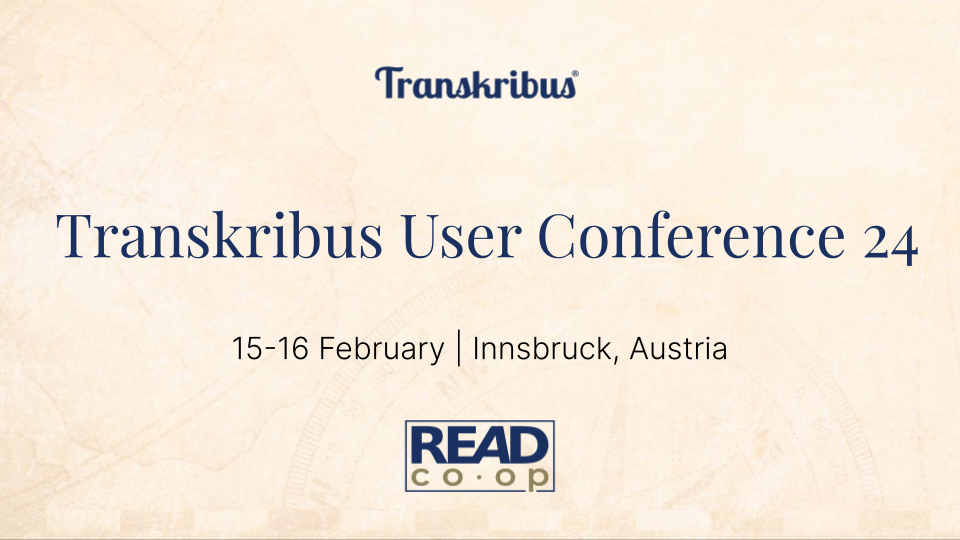
Following
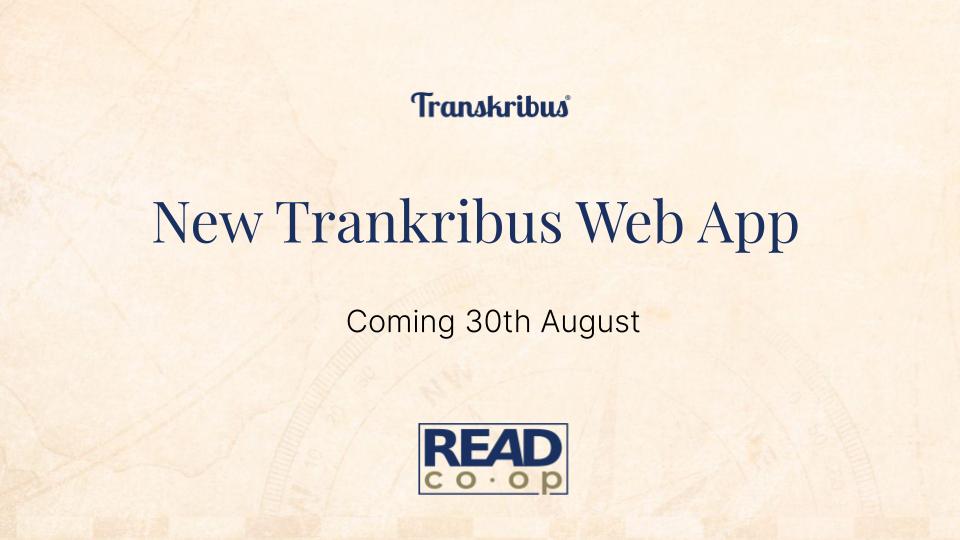
We are delighted to an
Start unlocking the past with Transkribus
Leverage the power of Transkribus to get the most out of your historical documents.

